#within the flawed system and in order for him to force in those changes he wants and keep targaryen hegemony he needs dragons to do it
Text
living in a world where one family holds the only WMDs until said family loses those weapons (dragons) and has to come to the realization that they have no real power without dragons to force it.
#was thinking about this yesterday and summerhall. like summerhall was just aegon having the realization that he cannot make change /#within the flawed system and in order for him to force in those changes he wants and keep targaryen hegemony he needs dragons to do it#if there’s such a thing as a liberal totalitarian i think that may be egg. he says i will ignore the social contract and force wage equalit#aegon v targaryen#asoiaf#guava.txt#house targaryen#aegon v
22 notes
·
View notes
Text
Title: The Number's Game
Chapter 1: The Seed of Curiosity
In a realm where numbers breathed, lived, and thrived, every digit carried a story—a journey from 1 to whatever heights or depths fate and choice would allow. Here, numbers were not just static symbols but beings of flesh and thought, their values reflecting the paths they had chosen.
Zain was a 1, as pure and unmarked as the dawn of a new day. In the city of Numerica, he wandered the narrow streets, observing the vibrant hustle around him. The air buzzed with the energy of numbers increasing their value, each one driven by the unyielding desire to rise. Some numbers wore their values with pride, like badges of honor, while others hid them, ashamed of how little they had managed to gain.
But Zain was different. Where others saw opportunities to grow, he saw questions, mysteries that tugged at the edges of his thoughts. His father, who had disappeared when Zain was still finding his place in this world, had often spoken of something more—of a balance lost to time. He had whispered stories of the Division weapons, ancient tools of power that could reshape their world, not by inflating numbers, but by restoring the equilibrium that had once been.
Zain’s father had been a 7 when he vanished, a respectable number with a reputation for fairness. But in the days leading up to his disappearance, he had become restless, driven by an urgency Zain had never understood. The last words his father had spoken to him echoed in Zain’s mind like a haunting refrain: *“There’s more to this world than we know, Zain. Beware those who seek only to multiply.”*
The city of Numerica was vast, its streets winding through districts that mirrored the divisions in value among its inhabitants. Low-value numbers crowded the poorer quarters, where every step was a struggle. In contrast, the high-value districts soared into the sky, the numbers there living lives of opulence and ease, their immense values casting long shadows over the less fortunate.
Zain felt those shadows even now, as he walked through the bustling markets. He saw the rich dismissing the poor with a glance, their eyes fixed on the next opportunity to increase their value. But what nagged at him was the thought that there was something wrong with this endless pursuit—something fundamentally flawed in the way their world operated.
His curiosity led him to seek out the oldest numbers, those who had lived long enough to remember a time before the current system of endless multiplication and addition. They spoke of a world where Division had been a force of nature, a power that kept everything in balance. But that power had been lost, hidden away when the elites rose to dominance, their Multiplication weapons twisting the natural order into something monstrous.
Zain’s heart beat with the pulse of a new purpose. He wasn’t content to simply grow his value like the others; he wanted to understand the deeper truth behind their world. The path ahead was unclear, fraught with dangers both seen and unseen, but he knew that he had to follow it, wherever it might lead.
And so, with the seed of curiosity planted deep within his soul, Zain set out on a journey—not just to increase his value, but to find the truth that lay hidden beneath the surface of Numerica. A truth that could change everything.
0 notes
Text
08 September 1315
Library of Circlaria
Third Level Society: First Version
Story Ten: Rose Anne Mahathy
Six years ago yesterday, the world changed.
Before September 7, 1309, Middle Remikra stood as the Early Republic, a society intent on functioning as a free democracy. Of course, it had its flaws, like having a hierarchical electoral system, a steadfast darkfire prohibition, and a forced apartheid of the Darkfire Community with the Mount Carris Perimeter.
All that changed with the death of Prime Minister Waltman, the 36 hours of conflict in the Basin District, and the placement of Finzi as the de facto, but later elected, Prime Minister. That change heralded the complete legalization of darkfire, the liberation of the Darkfire Community, and the arrival of the Fourth Amendment. And since then, broad darkfire acceptance has not only become better established, but has in fact become a norm.
This, of course, does not mean that all of our problems are resolved.
I should have known better. The worst I thought would happen would be grief from those ultra-nationalist holdouts, those like Kara Martins out there who believe the Commonwealth is a regime of evil, all because of the liberation of the Darkfire Community. In the wake of Kara Martins' departure from Lake Paron, I tried talking Peter Quora into adopting a pen name in order to protect himself. But Peter refused, stating that he had a large social network and that adopting a pen name would be too much unnecessary and unwanted work for him. He also insisted that any retaliation from Kara would just lead to more bad publicity for herself.
I doubted that then, and even more-so now, especially in the wake of everything that is happening with the current Third Level Society Dungeonmaster Skylar Meredyth. She may lose her job as the Dungeonmaster because Cassandra Lauth's brother, Robert Lauth, is saying that Skylar attacked him with spellfire discharges on the evening of June 28.
So Cassandra Lauth is challenging Skylar Meredyth for the Dungeonmaster position. She and Robert are against Skylar's camp, the Progressivists, but they are not Traditionalists. They are kind of independent of that dynamic, in fact. Nevertheless, in the course of all that is going on, Robert came forward and accused Skylar of collaborating with Peter Quora, Ceri Mains, Cray Fenton, and myself to keep that darkfire scroll secret, allegedly lying about it being spent, in order to sell the scripts ourselves and use the proceeds from that sale to help fund Peter Quora's Project.
This, of course, compliments the stance that Lauth's camp has against Skylar and the Progressivists. The Lauths agree with the Progressivists over darkfire, favoring its allowance to exist in the Third Level Society so long as no harm comes of it; yet, they also agree with the Traditionalists on the concept of self-sufficiency, vehemently opposing any connection of any kind to other dymensional planes of other organizations, like those with Cray Fenton and Peter Quora. This kind of long-term tension had been building over time over these big issues. It was only with the hidden darkfire scroll incident, however, that Robert Lauth saw an opportunity for an accusation. And so he pounced upon it.
It was Skylar who called for the motion with the Bookkeeper, Ronette Bolding. However, Lauth insisted on having an arbitrary meeting just between himself and the Dungeonmaster in hopes of settling the issue, surprising as that may seem. Bolding agreed and arranged for that arbitration meeting to happen without presence of the Bookkeeper in the Conference Room of the Hotel at Gentry County Airport. And this was scheduled to occur on June 28 at 11:00 pm.
According to Skylar, and according to the reports, she and Robert arrived at the front of the Hotel at around 10:55 pm. They saw each other, and were within walking distance but not talking distance. Suddenly and unexpectedly, spellfire discharges rang out. And from what I gather, both Robert and Skylar ran for cover, during which Skylar ran into the Lobby of the Hotel and called the police.
Skylar is a licensed spellcaster but did not have her talisman with her. Also, she received injuries. So needless to say, she is a victim in this case. And the same holds true for Robert. Unfortunately, they have not identified or caught the culprit yet.
However, the very next day, Robert began blaming the incident on Skylar, herself, stating that she set him up. When Gentry County Police determined that she was not a possible culprit, Robert wrote a letter to both the Gentry County and Ereautea Provincial Courts to demand an investigation. They each handed Robert's request to an Arbitrator who stated that there just was not enough evidence to suspect Skylar as a perpetrator. Apparently, Robert wrote a letter to a federal Arbitrator and is awaiting a response. Nonetheless, Robert has been fuming over this, saying over the Ticketer that Skylar played favorites with all the authority figures before launching her agenda.
This actually surprised me a bit because I thought the Lauths, being stout supporters of the Darkfire Community, would actually support Finzi. But then I keep forgetting that there is a politician out there named Peter Umbol, who is a stout supporter of the Darkfire Community as well, but is holding Finzi accountable, accusing him of passing policies that retain too much of the political and economic structure of the Early Republic. How well-founded these claims are is a matter of speculation. But nonetheless, the Lauths have been gravitating toward Peter Umbol.
Citing such apparent corruption with the proper authorities, Robert Lauth vowed to take matters into his own hands, a vow supported very much by those Third Level Society Members who support him. And thus, Robert wrote back to Bookkeeper Bolding with a request to have discord after all in the Caucus Chamber for Dungeonmaster Skylar Meredyth's removal.
I believe that the claim is outrageous, but what does the rest of the Caucus think? Up to this point, Meredyth did a lot of favors for the Society, especially with her project which successfully built a Great Bridgegate in Antemaersa linking the Arturian Realm to Cray Fenton and Peter Quora's existing dymensional planes. And the Lauths are citing that not only was this Project expensive, but also impractical and rendering the Society too dependent on other organizations. Some of them are calling for this and the other portals to be closed and decommissioned.
That, of course, would lead to a mass exodus of Third Level Society Members, not only from those directly being resentful of the portal closures but also of those citing other things that would be long term consequences. And I do not know if the Society would ever recover.
Jeo agrees with me on this, and so does Peter.
The Bookkeeper and Caucus discord begins Monday.
<- 20 June 1315 <- || -> 10 September 1315 ->
0 notes
Note
Do you think the Jedi had any flaws that you think should have been fixed? People like to say that the Jedi order should have been more loving and should have shown more emotion. And I also heard someone say that they were kinda flawed in a way at the time of the Clone Wars. Some I'm just wondering what do you think? Should the Jedi have changed things a little bit, or were they perfect the way they were? (Fyi I love the Jedi so please don't take this the wrong way)
This is gonna be a little repetitive because I have several asks along those lines, but if I started sorting them out I'd never get to answering them. (And don't worry, I'm not taking it the wrong way at all! Even if we disagreed, you'd have to be downright rude for me to be annoyed by an ask.) I kind of already stated my position on this a while back but it doesn't hurt to clarify again, so here:
I don't think the Jedi were 'perfect' the way they were, because there's no such thing as perfection in nature. I can make a list of flaws that individual Jedi had, if you want (Quinlan is rude, loves to show off, is a pain to work with; Ki-Adi comes off as haughty, he can be ruthless; Qui-Gon is impatient, stubborn, somewhat short-sighted; Jocasta is proud; Obi-Wan has a blind spot the size of Anakin and can be a bastard; Yoda can be too vague, Ahsoka too caught up in her own emotions, Mace and Adi too serious - etc. etc.) but that really wouldn't be the point, because the question is more regarding the Order's flaws.
"And I also heard someone say that they were kinda flawed in a way at the time of the Clone Wars"
Lucky you if that's all you've heard, ah ah, because the criticism is usually much more specific and often in terrible faith. But 'kinda flawed'? Sure the Jedi were. Everybody is kinda flawed, and every culture is kinda flawed, that's never up for discussion. But what those specific flaws are and how you fix them in a society is really the question when dealing with large groups, and we don't have the answer.
My own take is: no, I don't really think they should have 'changed things a bit.' As in: I don't see one or more big specific problems within the Order that are easily identified and fixed, and that, if fixed, would have made the Galaxy an unquestionably better place with no drawbacks.
Were they 'too cold' and needed to show more warmth? That's horribly subjective, but here's my (very outdated) masterlist where I delve a lot into Jedi culture in general, and here is a series specifically showing how free they are with physical displays of emotions, for example. Not loving enough is definitely not a Jedi problem!
Is it bad to take children away? It probably creates a lot of messy situations that I'm happy to explore, but it is ultimately the parents' choice + there is plenty of indication that the children are not entirely cut off from their birth heritage, and Lucas explicitly said that being raised communally was the best thing for anyone aspiring to the Jedi path. We have no indication that making the Order into a sort of boarding school would have been better.
Should they have been less involved in politics? They seem to get shut down more often than not. Should they have been more involved in politics? There's not even a consensus on that.
Should they have been spending all their time freeing slaves? Now that's not fair, because there is no realistic way for them to be doing that.
Were they too strict on Anakin, or not enough?
Should they allow for open romantic relationships? (which they more or less already do, because we have no indication that they explicitly forbid romantic connections and enforce that ban, just that they highly encourage their Knights not to commit to a relationship when they're already committed to the Order - can't be married to two different things, essentially) We have absolutely no indication that this would have a positive effect on the Order, or even that it's what most Jedi would want.
For the most part we don't even know the exact policies, Code, traditions and rules of the Order, so we have very little to go on from for practical things they could 'fix.'
Sure I'll admit that it was messed up to have Padawans fight a war, or to essentially torture Bane to get him to tell where he had hidden the holocron with the list of Force-sensitives kids, ignoring the irl and in-universe context around these things. Sure the war wasn't as clear cut as the good Republic and the bad Separatists. Sure the Jedi did unethical things throughout canon (little known tidbit: as did every single character in Star Wars, which isn't to say that criticism is meaningless, but that it always need to take context into account).
Maybe the Council should be bigger. Maybe they should have worked with non-Jedi more.
But I don't see big systemic issues in the workings or the culture Order that directly stem from malice, incompetence or unforgivable ignorance, and that could or should have been 'fixed' for the Jedi to be 'less flawed' as a group, because that's a big claim to make about any culture, even a fictional one.
People get to tear Satine to shreds for removing violence from Mandalorian culture after a civil war that shattered a planet, glassed their homeworld and decimated them, because she dared to go against the Mando beliefs and traditions, so I similarly reserve the right to defend that the Jedi's lifestyle seems to work well for them, and that we are never shown or told what precisely it is that they should have done better, and how they should have done that. I don't see that there are any drastic changes they would have needed to make to deserve to be recognized as good. As for changing just a little bit, there would be no consensus on what those little changes should be, because little problems are subjective, hard to determine, and every time you fix one little problem, you create a new little problem, and there'll never be a way around that.
tldr; Sure, the Jedi are plenty flawed, y'know, like people, but I don't think we can pinpoint one or more precise things they should have changed to be 'better,' being flawed doesn't in any way negate all the considerable good they did, and it's kind of a moot point anyway, because they all died through no fault of their own (Palpatine couldn't have given have a kriff about their philosophy, beyond the part where they were against murder and wouldn't let him be king of the whole universe, the bastards - Order 66 would have happened regardless of the rules about attachment). Basically, I can make a list of shitty things individual Jedi did or said, but nah, I wouldn't change the Order.
#ask#long post#meta#my meta#the order's flaws#anonymous#jedi order#jedi culture#jedi council#jedi positivity#obi-wan kenobi#mace windu#yoda#anakin skywalker#sheev palpatine#darth sidious#order 66#sw talk
152 notes
·
View notes
Text
Alright, let's talk about attachment
I can’t find clear information on when exactly the non-attachment rule was added to the code. It was either soon before or soon after the great sith war. Either way, for the VAST majority of the existence of the Jedi, it wasn’t a thing. Jedi got married and had families for over 20000 years, then added the non-attachment rule, which ultimately led to their destruction. And before anyone tries to tell me I believe they deserved to be genocided, I don’t. I have never actually seen anyone say that, but I see people argue against it constantly, and imply anyone who doesn’t think the Jedi were perfect and blameless thinks that. I don’t think they deserved to die, I think they needed to change. And Yoda says that himself, many times. The Jedi weren’t prepared for the return of the sith, or the war. They had separated from the military 1000 years before, and the galaxy was in relative peace all this time, so the order’s role changed to one that worked very well with their rules. Detachment meant they could be impartial when overseeing political disagreements, lack of possessions meant they would be focused on the mission at hand and not prone to taking bribes, and distancing themselves from the general population meant they were more or less uniform, and could be trusted not to side with someone for personal reasons.
All of this falls apart once they become an army again. Impartiality is a flaw when they have to defend one side at all cost and not even allow themselves to consider compromise. Lack of possessions and attachment to people means they are prone to taking unnecessary risks, because they have nothing to lose, and do things like send 14 year olds into battle, thinking of the “greater good” over the safety of children. And the order being a monolith, with set rules and philosophy distinct from the rest of the population meant the Jedi trusted Dooku long after they should have stopped, because he used to be a Jedi after all, surely he still follows the code.
Now, I am not saying non-attachment is always bad, I think it served a very specific purpose in the order, and to some extent worked for many years. However.
Humans are a social species. Human babies NEED physical contact and affection to develop physically. Children need a stable, strong, and supportive relationship to their caregiver to properly develop psychologically. And after last year I don’t think anyone will argue that adults don't need connection with other people just as much. And not just shallow interactions, but open affection and love. Love of any kind, because claiming that the Jedi only forbid romantic love is just untrue. I think people tend to forget that "Compassion, which I would define as unconditional love, is essential to a Jedi's life. So you might say, that we are encouraged to love." isn’t the actual doctrine, it’s a literal pick up line that Anakin uses on Padme.
Ahsoka and Obi-Wan both get criticized by other Jedi for their entirely platonic attachment to Anakin, and vice versa. Now, humans are the most common species in the galaxy, and in the Jedi order. Many other species are near-human, so it’s safe to assume at least some, if not most of them also need that companionship and affection to develop and live happy and stable lives. I do believe that non-attachment is a valid philosophy and chosen path in life if done carefully and within reason, I just don’t think we have a single major character that actually applies to. And chosen is an important word here. Jedi don’t get much of a choice. I’m not trying to start the baby-stealing debate here. I hear the argument of ‘force sensitives are dangerous if left untrained, and said training should start as early as possible’. I think finding a way to deal with that problem was an insanely complicated decision, and taking children into the temple as young as possible is not a bad solution. I don’t entirely agree with not letting them see their families later, (especially since in legends Obi-Wan was allowed to visit his family, which implies Anakin couldn’t go free his mother specifically because he was already too attached), but the idea is sound. I do also understand that no one is forcing Jedi to stay in the order and they can leave for whatever reason at any time. But that isn’t exactly a free choice either. Leaving the order means leaving the only home you remember, the only people you know to make your own way in the galaxy, and staying with those people means you can never fully love them. It’s a difficult solution to a complicated question, and for the most part, it worked (not always, and not exactly as intended, but I’ll come back to that.) Children grew up in the order, were trained to control themselves and the force, and became Jedi who were impartial, patient, and balanced. But everything falls apart when you introduce someone who wasn’t raised in the temple.
In The Rising Force, 13 year old Obi-Wan had barely been off Coruscant in his life. He describes himself as sheltered and unaware of all the pain in the galaxy, and says it was done on purpose, so younglings wouldn’t have to face the dark side before they were ready for it. But Anakin had seen nothing but darkness, pain and injustice before he joined the order. He was severely traumatized, and while the temple might have had some ways of dealing with trauma and PTSD in adults, they had no experience in treating the same in a child, because their children were kept safe and protected. The idea of letting go of your pain and fear only works if you know you have a safe place to come back to, if you’ve spent the first decade or so of your life in the most protected place in the galaxy. Anakin spent the first decade of his life as a slave. He couldn’t let go of his fear, because fear was what kept him alive. Fear is not irrational if you are constantly in danger, it’s what protects you, keeps you aware of the limits you can push before you get punished. And that mindset doesn’t fade just because you’re out of that situation, especially if your only family, the closest person to you, is still facing that danger every day.
I’ve seen people use every excuse possible to explain why Anakin didn’t see his mother again to avoid blaming the council, including, and I shit you not, “He just didn’t have her comm number”. But to me that seems disingenuous, when we see in his first meeting with the council that they already consider him too attached. It's one of the main reasons they don’t want him to be trained, so it seems logical that they wouldn’t allow him to see her once he became a padawan. I also want to mention that what Yoda says, “Fear is the path to the dark side. Fear leads to anger, anger leads to hate, hate leads to suffering.” Is just… blatant catastrophizing. Right? Like we can all see that the escalation is not rational there at all. Maybe it could apply to something else, but not to a child who just left his mother for the first time in his life and went from a tiny dustball in the middle of nowhere to the most populated planet in the galaxy, and is now being tested by a bunch of old people with the power to decide his future. Obviously he’s afraid, and obviously he’s not dealing with it the way Jedi younglings do. That, in and of itself doesn't doom him to fall. Also what Yoda misses there is that suffering leads to fear. This is a closed loop, and one that has defined Anakin’s entire childhood.
Let’s come back to how the system doesn’t always work. The way I see it, most of the characters we see are attached. Obi-Wan is considered one of the greatest Jedi of his time. Windu describes him as “our most cunning and insightful Master—and our most tenacious”. And yet, he was not insightful enough to look past his love for Anakin, his attachment, and see how close to falling he was. Ahsoka was so attached to Anakin she refused to listen to Maul on Mandalore, refused to even consider the posibility he could fall. She was arguably the person with the best shot at preventing the empire forming at that point, and she loved anakin so much she doomed him and the entire galaxy. Aayla admitted to thinking of Quinlan as her father, and also, apparently in legends had a long relationship with Kit. Even Mace didn’t follow the code when he decided to kill Palpatine, which directly led to his death and the empire. He also indirectly caused the war to start. According to wookiepedia “Windu viewed Dooku as the shatterpoint of the entire Separatist movement, which meant striking Dooku down would theoretically end the imminent clone war before it even began. However, Windu's prior attachments to Dooku clouded his judgment.” I’m not even going to mention Kanan and Ezra, who are obviously family.
So basically everyone is attached and lying about it. How has no one thought that maybe this isn’t the healthiest way to live and tried to change the code? Well, I have a theory, and it’s Yoda. He was 900 years old when he died, and was on the council for the vast majority of his life. I can’t find when exactly he became grand master, but it’s safe to assume he held some degree of power over the entire order for most of a millennium. At the end of TPM he tells Obi-Wan “Confer on you the level of Jedi knight, the council does. But agree with your taking this boy as your padawan learner, I do not.” Then he reverses that decision by himself. So either he has the power to veto the council’s word, or who gets trained is entirely up to him. Either way, not great, considering his lifespan is so much longer than most Jedi, and therefore his approach to life is vastly different. Humans need love and closeness to live. However, while we don’t know much about Yoda’s species, it probably isn’t a social one. You could count all the characters of this species on two (human) hands, and Yoda lived in complete isolation for 20 years on Dagobah, and only went a little bit insane. They are naturally rare, and therefore probably lead solitary lives in nature. Moreover, Yoda outlived every master who trained him, and almost every padawan he trained himself, (there’s a great post about that here) so even if he wasn’t naturally predisposed to non-attachment, he would have had to learn it to deal with all the loss he had to live through over the years.
A lot of people think that Anakin fell because he had attachments, which is not true. He fell because of how his attachments played out and/or ended. The most obvious example being Palpatine, who used Anakin’s trust and friendship to groom him for over a decade and actively undermine Anakin’s trust towards anyone else, especially the order. (more on that here). Obi-Wan refused to take on the role of a father figure that Anakin tried to shove him into, so he turned to someone who did accept it. It’s not Anakin’s fault that it turned out to be the worst person alive, nor can we expect him to notice when he’s known Palpatine since he was a child. Another failure of jedi non-attachment, because a loving parent or guardian would not let their child be used as a bargaining chip when the most powerful politician in the galaxy blackmailed the order into allowing him to meet Anakin regularly, but a distant teacher and detached knight thinking of the greater good might. The other attachments Anakin had were taken from him (Shmi and Ahsoka, the last orchestrated by Palpatine who was fully ready to give her the death penalty to make Anakin more unstable), or he was forced to lie and hide them, compromising his vows as a Jedi (Padme) or refused to choose Anakin over the order/their principles (Obi-Wan, and again Ahsoka, and to some extent Padme, but he’d already fallen then). All these people had every right to make the choices they made, but it wasn’t the act of loving them that made Anakin turn to the dark side, it was how those attachments played out.
I think everyone agrees that Yoda is as detached as a Jedi should, if not can, be, and that didn’t prevent Dooku from falling. We see that explored in more detail with Barriss and Luminara. Luminara is detached and distant, she’s fond of Barriss, but their relationship is not familial in the slightest, and she repeatedly shows her willingness to put the greater good and the mission before Barriss’ safety and even life. And yet Barriss still falls. A complex combination of events and choices caused each of those characters to fall, not the simple presence or absence of attachment.
And lastly, just as attachment can make you unstable if your relationship with that person is unstable, it can also make you stronger. There is a reason Anakin and Obi-Wan were the face of the army. Not only did their obvious attachment (the strongest between two jedi we are shown) make them more relatable to the public, but they, when working as a team, are shown repeatedly to be more or less undefeatable. They spend half of aotc flinging themselves off great heights because they know the other will be there to catch them. They know from years of experience that they have backup and they know each other well enough (or force bond communicate) that they can trust the other will be where he needs to be to help/save them. Contrast that to how Windu and Palpatine fight in rots once the window breaks- very carefully, clearly holding back to keep themselves safe. Neither of them has backup until Anakin arrives, but until the last second they can't be sure which one he will choose. Anakin and Obi-Wan fight the same way on Mustafar, especially when balancing on that thin bridge. No acrobatics, swinging arms to keep balance, keeping their distance, being almost uncharacteristically careful compared to how they treated heights in aotc, in tcw, and on the invisible hand in rots, because they both know the other won't catch them if they fall this time.
161 notes
·
View notes
Text
I had said before that the number 108 can be unlucky. It wasn’t unlucky at all for My Hero Academia: Vigilantes. But 108 is kind of unlucky for this episode: not only are we focusing on the Villains, but we just aren’t giving their story the structure and emotional weight it deserves.
(I either opened with those remarks or just made a bunch of corny jokes about how “Meta Liberation Army” can be abbreviated as MLA--and I’m saving those jokes for a future review.)
“My Villain Academia,” My Hero Academia Episode 108 (Season 5, Episode 20)
An adaptation of Chapters 220, 221, 222, 223, and 224 of the manga, by Kohei Horikoshi, translated by Caleb Cook with lettering by John Hunt and available from Viz.
My Hero Academia is available to stream on Crunchyroll and Funimation.
Spoilers up to My Hero Academia Chapter 325.
When I teach literature, I refer to the plot as a problem: it is something that the protagonist is trying to solve. This problem can take various forms, but it is often as an antagonist that the protagonist confronts. When this episode has the Doctor refer to a “villain” as someone “who turns nonsense into action,” that’s kind of the point: the villain is here to get the plot rolling. Without them, you don’t have a hero, you don’t have a story.
It has been long accepted by a lot of fans and scholars that superheroes tend to uphold the status quo. I think the first time I gained awareness of this popular argument--although likely not the first time I encountered it--was Dr. Horrible’s mangled remark that “the status is not quo.” More recently, however, I have been reading academic books on superheroes, and not only does that argument persist--that superheroes represent law, order, and upholding traditional norms even in the face of new evidence or out of sheer obliviousness to the need for systemic change--but the argument has become that, if a superhero story does not have the heroes doing something to effect systemic change, then it’s not a good story. I may be misunderstanding that argument, but if I don’t, then it’s not an argument I can stand behind.
The argument is that superhero stories tend to reduce complex issues to having avatars for each side of the issue--the good guy and the bad guy--get into a fight, where we are focused on the spectacle rather than on seeing actual people engaging in the actual work needed to address problems not on the individual level--again, one good guy physically fighting one bad guy--but on a larger scope.
I am oversimplifying this argument, as even those same scholars will point out that, initially, of course there were superhero stories that had the protagonist taking the fight against the system. Superman is one of the ones named most frequently, whether in his initial comic book premiere doing what police and media would not to face down a corrupt senator (a sign of things to come in his later fights with Luthor and in Justice League Unlimited) or fighting the Klan (in the meta sense, fighting their analogue on the radio show and, more recently, literally in the comics). It kind of makes Superman look like one influence on the Peerless Thief in My Hero Academia, but we’ll get to him far later in these episodic reviews.
Even with that exception of Superman, it’s not hard for me to agree with the argument that heroes prop up the status quo. That has been the plot point for My Hero Academia and why this war against the villains has been incoming: a system that depended on just All Might, now depending on a wife-beating abusive father like Endeavor with his crimes not popularly known, has a level of corruption that cannot stand up with just one man’s shining example of honest goodness and integrity to be the Symbol of Peace. It was why I appreciated the manga eventually showing that, yes, there was an entire network of assassins within the Hero Public Safety Commission to keep All Might’s hands clean--and, in retrospect, while Lady Nagant was our first named example, given what Hawks ends up doing to Twice, deadly force may be frowned upon by law in MHA but has to have been something Hawks was told he had legal authority to do. (Also, as I will never stop pointing out, Endeavor unintentionally and unknowingly killed another Pro Hero in Vigilantes, and we’re just supposed to pretend that was fine.)
But going back to this academic argument, about how superhero stories tend to stick to one-on-one battles and don’t let the heroes effect systematic change, I’m ambivalent. There have been a range of superhero or superhero-adjacent stories that have the protagonist making on-page, on-screen, obvious work to not just get into fisticuffs with the bad guy. I already pointed out Superman’s first appearance and his fight against the Klan. I can also identify other examples, some hamfisted like Captain Planet, others more nuanced like Korra reaching out to Kuvira in The Legend of Korra. While the scholarship I read bristles at the idea of reducing these fights to just avatars for good and evil, I shrug and say that kind of comes with the territory of a superhero story. I hate justifying tropes: it’s like saying “this fanservice is acceptable because that’s part of the genre”--which leads to its own set of problems, especially when I hear fools defending sexualized fanservice that is just not needed for the story and is abusive by gender and representation. Heck, The Brave and the Bold animated series had Equinox and Batman battle as giants representing the avatars of chaos and order--which is confusing enough, with Equinox having a vaguely yin-yang motif that debunks any clean separation between chaos and order. And yet, here I am, arguing that this kind of fanservice of a hero and a villain beating each other up is to be expected: you have a debate about ideals of what a hero should do when you see Iron Man and Captain America each representing a side in a fight, whether the poorly handled comic book Civil War or the better film version, and even then, that film also lets the individual personalities get in the way of saying anything meaningful about government oversight and individual agency, ideas better handled in that other Captain America film, The Winter Soldier, and even then that film also gets stuck in just being about Steve and Bucky’s relationship.
All of this is me saying that, when you add a superhero to the fight, you’re going to feel disappointed that almost nothing systematically changes in its setting, not only because, as I’m hinting, these are stories about individuals fighting each other and not stories about the individual against society or nature, but also because a superhero can only change so much of their world for the better before that world no longer looks like our own or a new societal problem has to emerge to create the problem that is the plot itself for wherever the story goes next. Once a hero makes the setting into a utopia, either a new problem emerges to show the fiction of that story and that a dystopia is always married to a utopia, or the utopia is revealed to be hollow (Shigaraki’s word of the day) and fake. My Hero Academia already showed the utopia of a world where people get to live with their Quirks is fake, not only by (largely necessary) regulation of those Quirks but also, as we’ll see more with Spinner, Compress, Toga, Gigantomachia, and others, looking different, or being socially aware, or having disabilities, or being the “wrong” size, excluded you from that society.
What I’m trying to say is that, once you add superheroes into a story to fix the problem, you can’t show what systematic change looks like. How do you write a story where it makes sense that no hero came to save Tenko Shimura from becoming Tomura Shigaraki? What’s a story like My Hero Academia supposed to do to show the problems with a society, if you have superheroes who can fix those problems by beating up the bad guys?
Solution: You have the bad guys beat each other up.
In this corner, the League of Villains, people who were made outcasts because they did not fit in--which reveals the flaws of a society that is not accepting people who may not be able to change their past or their bodily conditions.
And in this corner, the Meta Liberation Army--which reveals how society breeds people in business, media, and politics who abuse laws and societal norms to elevate themselves and create a social Darwinist nightmare.
Granted, these are some foolish schmucks for starting up this fight in public, but I’ll address how the MLA just doesn’t work in a later episode review.
But for now, let the fight begin. No matter who wins, at least we see how society at large allowed these Villains to emerge--and we can either see All For One’s dictatorial forces get wrecked, or see Re-Destro’s fascistic oafs get wrecked.
Unfortunately, no matter who wins, the Pro Heroes are going to lose, too.
I am overly impressed with myself for realizing all of this. And I say “overly” not only because this is arrogant of me but also because I’m pretty sure just about every other person following this series already came to this conclusion: if you want to show actual systematic change, you have to show what the villains are up to, because they are the ones showing the holes in our society that need to be fixed. Either a villain exploits those holes to cause damage to people, or the villain is themselves representative of unfairness in the system and, by breaking the law to save themselves and others, are unfairly maligned as villains.
That being said, I’m not a big fan of the “[Insert villain’s name here] was right” arguments. Yes, Magneto is justified in his goals and ethics, and the debate is the means he takes to them, so his existence is to show why the X-Men are screwing up and need to be more radical. Yes, Killmonger is right that Wakanda’s isolationism is reckless and allows for travesties to persist, but his choices are largely out of individual desire for vengeance, so he’s an example that T’Challa can follow. Taken too far, though, and you get people who preach anti-establishment notions without having an alternative or are just trying to sound edgy rather than actually pointing to the actual problem: it’s someone who celebrates the Joker without recognizing that, no, you don’t want to be that asshole, or who celebrate villain-turned-hero Vegeta just because he looks cool and without appreciating what steps he took to change and what fall he experienced before he got to the point of being a villain.
In all these cases, if done poorly, you have the same tired trend of a villain existing only so long so that the hero changes for the better. It’s as tiresome as I unfortunately sometimes feel reading post after post celebrating how complex and sympathetic the League of Villains’ members can be when, still, a lot of them are just assholes using empty excuses to defend atrocious behavior (primarily, just All for One) or, for the most part, are people put into desperate situations (Shigaraki, Toga, Spinner, Dabi, Twice) who are doing the best they can (Twice, Spinner) even if their actions are not defensible (Toga) or also out of line (Shigaraki) due to their own refusal to seek the legitimate help they need to work through their issues (Dabi).
It’s hard to read posts online calling the League members sympathetic when we have not had a chance in the anime to know their full story. And as with the slow revelation that this setting is not really as welcoming of people of all shapes and sizes as initially hinted, so too do the villains’ backstories show that they were justified in some actions they took, except for those that led to deaths. Too bad none of that really pops up in a meaningful way in this episode that would rather tease out Shigaraki’s back story, keep dangling the obvious answer to who Dabi really is, and short-sells what should be a meaningful friendship between Twice and Giran but is just dropped as fast as Shigaraki takes off Twice’s mask. Jeez, Shigaraki, that is a dick move to Twice…
But I’m already on Page 4 of this rant, so let’s get to the episode already.
Pulling back the curtain yet again, these reviews tend to follow a pattern. Since I first wrote about the MHA anime, my process would be to first re-read the chapters, then watch the episode in Japanese, then watch the episode in English, so as to retrace my steps in how I first encountered most of these stories, as well as to see any patterns in the production process moving from manga to anime to localization. But with this episode, that practice was made nearly impossible given how prevalent the hostility towards this episode, this arc, and this season have been, especially when a friend shared numerous reactions from other viewers about this episode. Seriously, for all the whining I just did the previous four pages, you could read this person or this person who are much better at explaining why the introduction of Re-Destro to the anime sucks, for more than one reason.
So, I had a different approach: I already had the flaws to this episode shared with me by other viewers, then I listened to the English dub, then I re-read the chapters, then I watched the Japanese dub with English subtitles.
And, boy, am I grateful I took that approach, because this episode is a ton of talking--too much talking. For an anime adaptation that cut so much of Spinner’s Leonardo from Ninja Turtles narration, I’m shocked that they kept the boring parts of his narration and cut the only good parts, including the very opening that had a lot more action and gave us a reason to sympathize with these Villains.
I know I’m a snob regarding animation; I have expressed before how, despite my love for animated works, I tend to appreciate them more for what they do with storytelling rather than the spectacle of the visuals. I really dislike works where the value of the work is in the animation alone: I am here to see a story unfold, and if there is no narrative, no plot, no beginning-middle-and-end, then what I’m encountering is a museum piece, not a work of cinema. (Feel free to bash me for that hot take: I’m still railing against Patty Jenkins’s ridiculous argument from this week.)
And as with most forms of karmic punishment I experience, I pay the price: if I rail long enough about works that are only all about the animation and not the story, then my punishment is an episode where all we get is a lot of story and not much in the way of animation. Yet I can’t even say we got a story here, so much as back story, exposition, needless narration--it’s Blade Runner only bad. As much as I have loved how this anime’s storyboards stick so close to the manga panels, the pan over the League listening to Shigaraki’s vague back story felt like the least interesting way to handle this scene, especially when it excises so much of Spinner coming around from questioning Shigaraki to sympathizing with him. Who would have imagined cutting so much of Spinner’s initial narration and the opening from Chapter 220 would screw up how to adapt Shigaraki’s back story from Chapter 222.
The anime cuts how this arc begins in the manga: Chapter 220 starts with Spinner facing off against an extremist group that hates him for his reptilian appearance--a moment that would have garnered more sympathy from the audience for these Villains than this episode is exhorting. We needed a scene to get behind these villains and agree with them, before we are shocked to hear Shigaraki say what we have long expected, that he just wants to destroy everything and make everyone as miserable as he has felt, to wake us up that, no, you may sympathize with these outcasts (to use Twice’s one-word self-description), but you shouldn’t agree with Shigaraki’s goals. (I know Shigaraki relents somewhat when asked by Toga, but it’s hard to backtrack from “destroy it all” to “destroy it all but not the stuff my friends like.” How on Earth is Shigaraki going to destroy Izuku when Spinner somewhat admires the guy and Toga...well, yeah, best left unsaid.)
While watching this episode, I also was reviewing other topics about anime and manga I’m going to go into more detail about later this month, and one topic of discussion is the assumption that anime and manga, by their visual style and story tropes, especially shojo and shonen, tend to be about big expressions--emotional outpours in words, movements, facial expressions, and actions to more easily communicate what is happening, regardless of context.
I hate to keep repeating “ambivalent” in my reviews (another academic word I need to expunge from my lexicon for a bit), but I’m ambivalent about that argument, that anime and manga, especially shojo and shonen, are better at communicating. If your character is unreadable, that likely has an intentional reason: we don’t get much of a read on the Doctor in this episode, not helped by his mustache and glasses, but we also don’t get a read on what Shigaraki is up to.
This episode only heightens my regard, not just about anime, manga, shojo, or shonen, but in animation and comics at large, that not everything is readable in what a character is planning.
On the one hand, I do agree that visual works tend to make ideas easier to comprehend for some people who can engage with such visual works. As someone who teaches English literature and writing in a United States setting, I use comics in my teaching to cross language and cultural barriers, especially for students for whom English is not their primary language or who are the first in their family raised in the United States. And this teaching approach also helps in reverse: I include manga and anime in my teaching to show how not all details cross language and cultural barriers in a one-to-one correspondence, hence the challenges of translation and localization, and how all of us struggle to make ourselves understood within our own primary language to someone else who is fluent in that language, let alone trying to translate into another language or to present ourselves in a different set of cultural norms.
On the other hand, anime and manga are not a fixed genre. Yes, I agree that the images tend to emphasize big eyes, big expressions, and big motions--but that’s like saying all animation is Looney Tunes, or all animation is Disney, or is Dragon Ball, and so on. Likewise, as I’ve discussed elsewhere, shonen is more than just one type of storytelling, and the same goes for shojo. This arc of My Hero Academia is placing focus, after admittedly far too long, on the Villains as the protagonists--and their behavior pokes holes in the idea that things are obvious, when the Villains are themselves such liars, so crafty, have their own hidden agendas, are keeping secrets from each other. It’s as if their behavior is a commentary on this plot and how BONES is adapting it: the Villains are keeping secrets, so this plot is going to keep its secrets for just who Re-Destro and the Meta Liberation Army are, what their personalities are like, and what Shigaraki and the Doctor have in mind for getting what he wants. We’re even kept in the dark as to Shigaraki’s full back story; we’re in the same position he is, knowing just little bits and able to make assumptions from a handful of visual cues and memories, without fully knowing who the hell Tenko is. Add to that Spinner’s struggles to narrate all of this and to get into Toga’s mind and Shigaraki’s mind, as well as Dabi’s own secrets and agenda with Hawks, and we have a story that blows up the notion that anime and manga are easier for reading a character’s mindset: no, they are not always easier, not when the creators deliberately mislead the audience or keep them in the dark for a surprise.
By keeping so much of the audience in the dark, so that we become aware of how deceitful villains can be, and we are put into Shigaraki’s place of not knowing where he came from. This should be a set of brilliant choices by BONES to adapt this arc in this manner. But the problem is, no, almost none of this gets anywhere close to brilliant. It’s not brilliant--it’s frustrating, because we already know what is going to happen. You can just pull up the manga at low cost with a Viz account and read all of this in the order it was originally presented and get the answers ahead of time. And if you’ve been reading the manga all along, you already know how this arc ends, and you know stuff from the next set of arcs so that you do know already what Shigaraki’s back story is, what Dabi was really up to, who survives, who dies. You even learn more about Compress’s back story--stuff that really should have been hinted at much earlier in the manga, and could have been hinted in this adaptation but as of this episode has not.
Maybe that is why the anime removes Re-Destro murdering his assistant: it’s such an odd moment that it is challenging for me to get a read on Re-Destro, as he alternates in the manga between being very friendly and devoted to his comrades but also violent and heartless.
It may be obvious that I didn’t like much of this episode. I think when I stopped taking this episode seriously was when I heard the voices. Like I said, I tend to start with the Japanese dub first before getting to the English dub. And I have nothing at all against English dubs: I would not be listening to them as much as I have, often first before I ever hear the Japanese, and I would not be a fan of so many English-speaking actors in dubs if I had any animosity to the craft, their work, and the benefit they provide for creating a larger audience for these stories. And nothing against Larry Brantley and Sonny Strait, but some of this casting feels off. I wasn’t able to take this episode seriously as soon as I heard the voice distortion that was used for Re-Destro’s phone call: that took me out of the story. If I had the chance for localization, I would really need Twice or someone to call out how freaking ridiculous that Mickey Mouse voice sounded. You have freaking Sonny Strait here: use the Krillin voice, use the Chibi Ragnarok voice, use the Usopp voice--use something, really go bizarre here, it’s just a voice distortion device! And as I said, nothing against Strait, but when I hear Re-Destro when I read the manga, that’s not the voice I have in mind. For right now, HIroaki Hirata in the Japanese dub is closer to that smoothness I expected for this character. But I have no doubt Strait will do excellent as Re-Destro’s empowered form: think Strait’s role in The Intruder II from Toonami. It’s just that Re-Destro in the English dub is lacking that odd refinement I was expecting.
Granted, it’s the same problem for me when I hear Brantley as Spinner: I am making unfair assumptions that don’t suit the goals of the creators when it comes to this character. It is sadly not as obvious in this episode as it is in the manga: this arc in the manga starts with Horikoshi invoking Laird and Eastman’s Teenage Mutant Ninja Turtles by having Spinner, who is already a sword-wielding reptilian martial artist, narrating just like how Leonardo narrating at the beginning of the very first issue of TMNT. I wanted a voice for the English dub that is like Leonardo’s, a little higher pitch and more youthful, like what Brian Tochi brought in the live-action Turtles film or what Cam Clarke and Michael Sinterniklaas bring in the animated versions. I think, for the Japanese dub, Ryo Iwasaki’s performance as Spinner is very close to what I expected. But that also may seem too obvious: Spinner may be young, but giving him an older-sounding voice can belie his inexperience, youthfulness, and naivete, similar to how people make assumptions about him by his reptilian appearance. The anime is putting me into my place--I think of Spinner one way other than who he really is, so I’m no better than the people around him who have discriminated against him for his physical appearance.
Just as I have a set of assumptions that unfairly influence how I would cast Spinner, I also think Re-Destro should have sounded more refined and less graveley in the English dub. But my expectations belie that, just the Joker whom he resembles, Re-Destro puts on this cultured facade to hide that he is just another violent gangster thug, someone who would kill his own assistant. I know I cited examples above about how complex Re-Destro is, but it’s hard for me to see him as sympathetic just because he’s crying over something he did out of his own volition: he coldly killed his office assistant Miyashita, his tears and kind words don’t suddenly make this a warm and cuddly death, we don’t get to think of him as our woobie. It only makes it more irritating that BONES so far has cut not only that scene of Re-Destro killing Miyashita but also Re-Destro’s TV commercial: it would clue us in that the reason he has that gravelly voice is because, no matter how much he tries to present himself on TV, he is not that kind of a man.
But since I invoked the Joker comparison to Re-Destro, yeah, I’m disappointed we didn’t get Troy Baker as Re-Destro, as unlikely as I imagine that would be to happen, regardless of Baker’s previous work with Funimation. It does lend a bit more to conspiracy theories on my part, though, given casting director Colleen Clinkenbeard telling Twitter followers to stop expecting Mark Hamill in MHA, it’s never happening--we can’t even get Troy Baker doing his Mark Hamill Joker.
(I’m not being fair to Baker: I’m not saying his Joker is at all bad--it is not, he has been excellent as Joker, especially playing him and Batman in the Ninja Turtles crossover film, but it is obvious Baker is performing the kind of Joker that came out of Hamill, so I’m trying to say he’s doing the “Hamill Joker,” rather than the “Nicholson Joker,” the “Ledger Joker,” or the “Caesar Romero Joker”).
It’s also a challenge to sympathize with these characters when we aren’t getting what this arc should give them: a re-introduction. I hate approaching this episode in a post-James Gunn The Suicide Squad world, but seeing how much MHA owes to not The Suicide Squad of the comics but that motif in so many superhero comics, there is that missed opportunity to reacquaint the audience with who are the members of the League of Villains. So, where the hell is my freeze-frame re-introduction to each League member? There was that fan theory a long time ago that Giran was really Present Mic in disguise: imagine doing Present Mic’s introduction of characters by name, Quirk, and pithy comment, only it’s Giran in the announcer seat this time.
(Don’t even get me started on how annoying it is to have Izuku handling the post-credit preview: give that to Spinner.)
Again, maybe it is brilliant for BONES not to include some re-introduction scenes, whether narrated by Giran or happening naturally in conversation between these characters. These Villains barely know each other’s back story, so there’s no artifice where they would believably share their back stories to each other in conversation in this context. And as I said, Shigaraki does not know enough about his own past, and Dabi is hiding his real identity. But when we’re stuck with Spinner as our half-hearted narrator, who seems not to know why he and Toga are still here with Stain being gone, and when Toga is this dull in her answer about what keeps her going after Stain’s arrest, and when Spinner himself seems not to know what he’s still doing here, all of that does not communicate a reason for us to keep going with this story.
I know this arc is going to get better, storywise at least, just based on how it went in the manga. I can only hope that the animation can capture the chaos that the original manga illustrations showed. But I am trying to think what a new viewer is going to do if this is their introduction to this series. I’m not invoking the Episode 7 Rule, I’m not doing a hypothetical experiment to gauge which episodes are the best to bring a newbie into this series--I am asking, honestly, if a fan was already into this series, and was watching it one Saturday morning, and a friend or roommate or relative saw them watching, they would be utterly lost about why they should care about this. Even the explanation for why Twice is indebted to Giran is presented as such an afterthought that does disservice to a potentially emotional moment, to what is supposed to be a pretty deep friendship, as deep as it can be for a weapons trader like Giran and an outcast-turned-criminal like Twice, so that, when Twice helps rescue Giran, we feel that emotional payoff.
It is honestly shocking that, for all the throwbacks, recaps, and flashbacks we get, including how Giran’s fingers match up to previous places where the League fought, that this still leaves a new viewer in the dark. And the problem lies at the feet of MHA arriving at a fifth-season slump: the series has gone on so long that things feel lazy and making far too many assumptions on what knowledge the audience is bringing. You’re not getting a bigger audience if you keep appealing to the diehard fans and the people reading the manga. After all, why would you keep doing ridiculous recaps and flashbacks if the fans already know what happened?
But speaking of the recaps and flashbacks, that should have been how this episode redeemed itself. As I said last time, if you re-worked the order of episodes to start with the Oboro Shirakumo story, that would be more shocking. But what if this episode could have been the very first episode of the season, and following the trend of previous seasons, make it a recap episode? We already had Izuku narrating a clip show, Class 1A at the pool, a photojournalist visiting the UA Dorms--it would be so much more interesting seeing “League of Villains camping in the woods while in the background Shigaraki gets squished by a giant.” Have the Villains tell campfire stories about how they got here: it would be a great excuse to re-use the animation and save on the budget. You could fit in a few gags, as Toga starts telling a really gruesome story but gets distracted by all the blood in it, while Twice’s story bounces between sugar-sweet happy and grim-and-dark chaos, while Compress and Spinner are stuck trying to keep them focused. It’d be a hell of a lot more interesting than how BONES somehow screwed up a potentially emotional volatile moment between Izuku and Amajiki that would put into question whether Izuku is going to have to kill a Villain and just how devastated Amajiki feels after Mirio lost his Quirk.
And speaking of whether Izuku is going to have to kill a Villain: obviously, this arc is setting up how much more dangerous Shigaraki is than UA gave him credit. Back in Season 2, I hated how Nezu and UA staff referred to him as a “man-child,” given the connotations that have surrounded masculinity and being a man. I wrote that before 2016; in this post-2016 atmosphere, and the increased prevalence of toxic masculinity, I am, once again, that annoying word ambivalent. I am likewise ambivalent how well this series has shown Shigaraki to be able to form the plan he does by episode’s end. We’re only told by Spinner how much faster Shigaraki is getting and how much slower Gigantomachia has become--but the animation doesn’t show that. And we’re being told how great Shigaraki’s plan is--when it sounds ridiculous.
By cutting so much of Spinner’s narration from the manga, we also don’t get a scene where Spinner confronts Shigaraki to ask him what is his plan. Up to that point, Shigaraki has said that, with Kurogiri gone over the last month and the computers at the old League hideout destroyed, they can’t reach the Doctor. Spinner is insistent: what is the plan? Shigaraki responds that he just told them--as Gigantomachia crashes through their hideout. The other characters explain for readers like me who aren’t following: Shigaraki just said Kurogiri was gone; to contact the Doctor, Kurogiri sought Gigantomachia; Gigantomachia would sniff out where Shigaraki is and bring him to the Doctor. Brilliant--that shows more attention to Shigaraki’s planning and scheming, and now, it’s not even here in the episode to make me think this guy is that smart. (This episode also had Shigaraki reveal his plan to have Gigantomachia attack the MLA, whereas it was Spinner who predicted that was going to be Shigaraki’s plan--so, again, we’re not letting Spinner stand out as smarter than we expected, either.)
I know Shigaraki is supposed to be our chessmaster, given his association with gaming, especially when he was faking his ignorance about shogi to lower Overhaul’s guard before defeating him and stealing his Quirk-cancelling bullets. But I’m having the same problem I had when following All For One throughout this anime: it just feels like these two antagonists are getting ahead out of sheer luck and because everyone else is a fool, not because either of them are that great as villains. Give me a Xanatos, give me a Luthor, give me a Norman Osborne (not Clone Saga Osborne, a different one). Show me Shigaraki is more than a pawn for All For One and the Doctor, because I don’t feel anything here, not even when we’re supposed to feel that Shigaraki has some legitimate concern for All For One that just isn’t getting communicated to me, whether by my stubbornness or because the content is not giving the animators and actors what they deserve. Eric Vale can sell the hell out of a scene, but Shigaraki’s talk about All For One is not giving that opportunity to the actor.
My remarks this time are a lot more disorganized and doesn’t really arrive at any conclusion. I have more to say about how this arc works and doesn’t work, especially when it comes to how ridiculous the MLA comes across in underestimating the League, but we’ll get to that next time.
61 notes
·
View notes
Note
Given how the Mouse ruined Luke 'A Jedi like my father before me' Skywalker by making him force a toddler to choose between training as a Jedi and seeing his papa- I have zero respect for what they will do in the Kenobi series
Yeah, and as I said before, at least within Luke’s and Anakin’s lives, Obi-Wan, Yoda, and most of the old Jedi Order elders are supposed to be viewed as those stagnantly arrogant, boring, blindly hypocritical and self-righteous, and emotionally repressed assholes who are generally well-meaning, but seriously misguided in their beliefs and lifestyles.
Think about it, Luke and Anakin are emotionally driven male protagonist/antagonist characters. They help change the galaxy being driven by those emotions for better and worse. The overall old Jedi Order are all duty and security with complete denial of emotion and individualism altogether, while the Sith are only fueled by negative emotions of personal anger, hatred, fear, and paranoia to fuel the dark side. To overcome negative emotions, though, you actually have to talk about them, find healthy catharsis, and allow for people to feel like they can be honest about themselves with others without shame or judgment.
As Vader, Anakin becomes more cold and duty bound, but he still is ultimately fueled by poorly dealt with anger, anxiety, fear, and self-hatred he takes out on the galaxy and at Sidious’s command because most of his life he spends his time getting shut down, shamed for wanting, and denied those opportunities for freedom and healthy catharsis after leaving his mother with the Jedi and eventually Sidious, so eventually he just gives up on trying altogether out of exhaustion and despair.
Then, Luke comes along and inspires him to express empathy, authenticity to himself, and kindness again because he is kind, non-judgmental, and supportive without being an enabler.
Luke is unafraid to emotionally express himself honestly and healthily, and doesn’t have compromised agency, so he saves the day and helps reform the old Jedi Order by finding a healthy balance.
By contrast, Obi-Wan is supposed to be a relatively stagnant foil to both of these characters by spending his entire life mostly avoiding all of his personal emotions and individual beliefs to be Yoda’s teacher’s pet, the “perfect” Jedi. He is supposed to symbolize the fact that even the most extremely repressed and devoted Jedi of the old Order were deeply flawed in their arrogance, total emotional/individual denial, and passivity, in spite of their good intentions.
He’s not supposed to be a progressive gray empathetic Jedi who changes the system. That was Luke Skywalker’s story.
He’s not supposed to be a tragic character who initially had all the emotionally vulnerable, kindhearted, and empathetic qualities to become the potential revolutionary hero for the Jedi that his son became in the OT, only to tragically end up plunging to the darkest depths of their anger, anxiety, fear, and despair after constantly being let down by those with power over him throughout his life to ever feel safe doing any better, and then miraculously feel inspired to come back to the light when it seemed like any humanity and hope left was gone for him. That was Anakin Skywalker’s story.
At least within the timeline of Luke and Anakin’s lives with him in the Jedi and the Sith, Obi-Wan Kenobi is not supposed to be all that much of a character you look at for a compelling character arc or coming of age story. He’s supposed to represent the flawed and stagnant extremist collectivism and total emotional/individual denial that the most devoted Jedi of his time displayed. The whole point is that he failed by trying too hard to be the perfect Jedi as according to Yoda, rather than just being a good person by being himself.
It may not be a role that makes Obi-Wan feel profoundly dynamic, interesting, or relatable, but that is the whole point of this character in the main canon narrative of the OT and PT sagas. He was meant to be more of a symbol of everything wrong with the old Jedi who threw away their entire sense of self from birth to death to fit in because they felt confident in nothing else, rather than an ideal or tragic hero.
Unless they were exploring his childhood before Luke and Anakin came along to show the audience why he became that stagnantly and unapologetically arrogant and emotionally/individually in-denial perfect Jedi™️, or we see him only admitting he realizes he was wrong after Anakin sacrifices his life for Luke as a force ghost, any sort of adventure his character goes on, or “growth” for his character undermines Luke’s and Anakin’s arcs, and the overall theme of the old Jedi Order being a fundamentally flawed, though well-meaning institution.
@tragicfantasy-girl
@mynameisanakin
@the-chosen-anakin
@padme-amitabha
16 notes
·
View notes
Text
Fearful Avoidant Attachment and the Single Spy
Caveat: I’m not a counselor of any sort, and I’m applying labels to fictional characters. Don’t take this too seriously.
This post has been kicking around in different forms in my prompt document for awhile. I will start posting my Yavin fic this weekend. A major element of this fic will be the dynamic between Theron and the playable character/love interest. Their interactions will be informed by how I view his attachments. I’ve put some of this into the fic series already.
“Attachment” in the Star Wars universe is the idea, according to George Lucas, that Jedi should love everyone but not get attached. “Attached” in this context is possession, greed, being willing to do things for individuals rather than the greater good, and ultimately the fear of loss. Attachment is a negative concept in Jedi philosophy.
However, I would argue that while this philosophy is in the back of Theron’s head, Jedi attachment concepts are not what makes Theron’s personal life messy. It’s the personal context surrounding that teaching and his life events that shape this. So let’s look at real life attachment theory.
In its most basic form, attachment theory is the idea that children need to develop a positive relationship with a caregiver to turn out ok. If the child is neglected, then they will have problems forming healthy attachments to others. There’s a lot of caveats to this theory. Some put the threshold of ‘must have positive relationship by x age’ to age 2 or age 5. Others state that this is problematic, because if a child loses their caregiver and passes into the hands of a less affectionate or downright abusive caregiver, then their positive attachment formation by age x doesn’t count for much.
There are several different types of attachment that a person can have. A secure attachment is what most healthy relationships are rooted in. People feel safe and secure within themselves and within the relationship. Jedi can be attached in this fashion, even if they don’t call it this; the Jedi have orderly boundaries and a clear understanding of what their associations entail. They have care systems for younglings and padawans, which were like pre-modern apprenticeships. They are secure within themselves as Jedi and in their relationships outside the order. They are at peace.
An insecure attachment has a flaw in it; something is wrong in how the person relates to themselves and others in relationships, platonic, romantic or otherwise. One type is dismissive or avoidant; the attachments are actively avoided, so the person is often isolated and rejects others and their friendly overtures. Another type is anxious or preoccupied; people tend to get very clingy or possessive with anyone they latch onto, which can cause the relationship to self-destruct (hi, Anakin).
Then there is fearful avoidant attachment, the label I think fits Theron Shan, our favorite high-quality spy and absolute emotional disaster. In theory, Theron tries to avoid deep emotional attachments because he’s scared of being left behind or not having those attachments reciprocated. At the same time, he desperately wants those attachments and relationships, but the potential of failure makes him avoid or even sabotage the relationship. That results in an on-going war between Theron and his feelings. To quote Psychalive, “the person [he wants] to go to for safety is the same person [he is] frightened to be close to. As a result, [he has] no organized strategy for getting [his] needs met by others.”
Why does Theron have attachment issues?
Some accuse Satele Shan or Jace Malcom of being “bad parents.” There’s a problem with this premise: although there is a biological relationship, neither Satele nor Jace had a parent-child relationship with Theron. Jace didn’t even know Theron existed until the child was 26, so he couldn’t act in any capacity. Satele gave Theron up to be raised by someone else; she opted out of the role of mother and did not talk to him as mother-and-son until Theron was 26. There isn’t an abusive or neglectful relationship here because there isn’t a relationship, period. Much like romantic relationships, it’s better to have no relationship than a bad one. Jace and Satele didn’t raise Theron. They were strangers to him until he was an adult. They were never his caretakers. Who did Theron have attachments to?
Theron was raised by a Jedi named Ngani Zho, who had been Satele Shan’s master when she was a padawan. After Satele gave birth in a cave on some planet, Zho took the child and raised him as his own son. This was irregular, honestly. Jedi younglings that express some sort of control over the Force are typically put into a creche at the Jedi Temple; we’ve seen this in the Star Wars prequel films. Guss Tuno references this in SWTOR, as he was chagrinned to be in class with a bunch of five-year-olds in bathrobes. Theron was raised by Zho directly and they were constantly traveling, based upon comments we read in The Lost Suns comic and in the novel Annihilation. Theron never entered the creche because he never manifested signs he was Force-sensitive – not even a little like Guss.
Zho traveled with Theron until the boy was an adolescent. Then, Theron was told by Zho to travel to the Jedi Temple at Haashimut to receive more training; he could do no more for him. The trip through a desert nearly killed the boy. When Theron had recovered, it fell to Master Till’in to tell him he would not be a Jedi. Ever.
Instead of telling Theron or notifying Satele about the boy’s lack of Force aptitude, Zho sent him onward and then disappeared. There is no indication that Zho told anyone where he was going or why. When Theron met Zho again at age 23, the Master’s mind was scrambled and confused; he couldn’t give any answers to Theron about anything. Was there a mission he had been set on? Or did he just wander off on his own?
For storytelling purposes, it’s convenient to pair Zho’s departure with the aftermath of the Treaty of Coruscant. In the year Theron turned 13 (3653 BBY), the Great Galactic War ended with the Treaty of Coruscant, wherein the Sith Empire enforced demands on the Republic. The Sith won. Zho leaving could be tied to this (through a mission or quixotic urge), but the source material isn’t clear on the timing.
Theron’s life suddenly became very uncertain. His entire life had been built up to becoming a Jedi. To some extent, even though he hadn’t done anything wrong, Theron probably felt like he was a failure. We know he tried to fix this; in The Lost Suns, he acknowledged pursuing access to the Force through the Matukai Force tradition – being an ascetic. In Annihilation, he recalled and took particular umbrage at the “arrogance” of the Jedi – those that made him feel like any other path was second (or third or less)-best. This diminished over time, but the revelation about his lack of Force Sensitivity probably left Theron feeling very insecure about himself and who he was as an adolescent/young teen.
In terms of his relationships, Zho was gone with no forwarding address. The man Theron called his father was no longer reachable, and for another ten years, there would be no closure as to what happened to him. Zho had actively endangered Theron by sending him through a desert to Haashimut. Did he gamble that the boy’s Force Sensitivity would manifest in a life-threatening crisis or something? Who knows? Theron never went into the Jedi creche, so he didn’t have close peers or friends beyond pen pals at best. Theron had not spoken to his bio parents at all to this point, and he probably didn’t know many (if any) non-Force Sensitive kids. With his expulsion from Jedi society, Theron’s entire relationship network was gone.
This is important to understand -- Theron had been raised to not have attachments that would lead to selfishness or fear of loss, but he was raised to be able to love and care for others. He lived in a structure that fostered good psychological attachments (secure attachments) to the order and to his fellow sentients without possessiveness or jealousy. Theron knew his mother gave him up. He knew one day Zho would give his care over to another Master. He knew one day, he would leave the Temple to go out into the galaxy. Theron knew how the galaxy worked and his role in it...
..and then it was torn away from him. No more masters, no more knowledge of what came next, no way to ever work with his mother as a Jedi. His life to that point had been an illusion -- he was never able to access the Force, and Zho knew it. This left Theron as insecurely attached, as nothing that he anticipated for his life would ever happen, and he knew nobody that would accompany him into this new life.
External to all this, the Republic Theron was raised to serve was on the losing end of war. How the galaxy worked, as far as Theron knew to that point, was going to change. After Till’in told Theron the truth, all we know is that he spent some time in Haashimut before going elsewhere. We the viewer have no idea what happened to Theron from adolescence until he was 16, when he entered SIS per Annihilation. This may be a canon math/timing error, or it could be reasonable; Theron might have been able to get permission to join a government organization at 16. If Theron was in foster care or a ward of the state or something else, whoever was involved didn’t make an impact worthy of mention thus far in SWTOR canon.
Theron described Zho in The Lost Suns as “never reliable.” That was a 23-year-old looking back. Yet, he referred to him as his father in Annihilation three years later, and even eight years later in SWTOR: KotFE, he mentions that “Master Zho would be proud.” This seems contradictory. Additionally, in both The Lost Suns and Annihilation, SIS Director Marcus Trant expressed concern about Theron and his issues. Theron was a workaholic. Being a workaholic is actually a sign of having attachment issues; a person attaches themselves to work, not people Theron expressed desires to run away, go on vacation, and do new stuff… but he never did these things – couldn’t get away from the job.
Attachment theory states that a child has difficulty with attachments if they are abused or somehow neglected by their caretaker. The desert march definitely strikes me as falling into one of those categories, but again, Zho’s logic isn’t readily offered up to the viewer, nor are many details about Theron’s life as a traveling youngling. That all said, Zho’s traumatic departure probably caused attachment issues that had no other herald.
Why do the labels “fearful” and “avoidant” fit Theron?
Theron Shan as the player met him in Forged Alliance SWTOR was a professional. Flirting was ignored, mildly acknowledged, or, rarely, fully reciprocated. There was no physical contact between Theron and his asset. This doesn’t seem off or irregular until his romance is compared to that of Lana Beniko. She didn’t have the same issues expressing affection for her asset on Imp side; she touched their face and gave them a hug by the time the spies went under deep cover after Rakata Prime. Even if the player did not romance Lana, Lana herself was keen to make a team and bust open the conspiracy; she wasn’t as willing to go it alone.
Avoidant people tend to refrain from contact, and they like being independent. They don’t do well in teams. Sound familiar? Fearful avoidants also have the concern that they will fail their partner or that their partner will fail them. If the player was Imp side, Theron was a jerk well into the Rishi storyline. Eventually, Theron did come around. His dialogue and follow-up letter reflect the fact that he actually did want these connections and attachments. He enjoyed the time he had with the player.
This is particularly pronounced if Theron was romanced by the player on Rishi and Yavin; first physical contact occurred on Rishi with a kiss. If the player was Pubside, the fade-to-black and his comments on Yavin indicate they had sex. Those episodes of affection, paired with the Pub post-Yavin letter and dialogue, really emphasize the connection that was formed. Interestingly, Theron did not get a fade-to-black with the Imperial player. One might argue that he knew they were going to leave him, and so he couldn’t –wouldn’t—get attached.
…. And then Ziost happened. Theron refused to ask for help. He didn’t want to depend on that attachment. He was distant on Ziost, regardless of how far the relationship went, and if Pubside, he declined a drink afterwards.
Whatever transpired between Ziost and the Eternal Fleet Incident, it’s clear that a romanced Theron and the player never defined their relationship. There were certain boundaries that never were crossed. He’d “like to think” the player is dreaming of him, but he didn’t want to presume. Even after Theron got into a romantic relationship on Odessen, he still struggled with his ability to be attached, as evidence by his letters and expressions of affection and concern throughout the KotFE/KotET expansions.
One might argue that the traitor element of the Nathema Conspiracy was partially caused by Theron’s attachment issues: his independent streak, his inability to ask for help, his lack of faith in others to do the job right (not telling anyone the truth), his lack of faith in himself (his willingness to understand why the player might dump/exile him). If romanced, he gave one of his Holonet messages the subject line “I love you,” but even then, he did not clue the player into his self-made mission. Certainly, the Nathema Conspiracy happens because of Theron’s desperate desire to save the galaxy and the player at any cost – including the relationship itself and his life.
For those who let Theron live, the attachment issues have faded as Theron has gotten engaged/married and/or reformed a relationship with his bio parents… or the writers have moved on from Lana and Theron as companions. Regardless, we have to keep in mind that Theron is closing in on 40, and he has grown as a character since he first appeared in Star Wars media at age 23 (baby and adolescent only in flashbacks). His issues with his relationships, the Jedi, the Republic, and his bio parents have changed over the course of 17 years. In the last story patch, people who have romanced Theron received letters from both Theron and his mother about how good the player is for him, and it’s very satisfying to see how far he has come.
How does this label of ‘fearful avoidant’ manifest in your fanworks?
Since not everyone is into fic, I’ll drop this behind a cut.
Basically, my version of Theron wants love but is terrified of all the feelings and closeness that come with it. When people get close, he draws away, but still wants them to be close. Theron has had good relationships, but if it gets too serious, he runs. That’s the case for his last major relationship prior to my oc; his Mirialan girlfriend was drawing a tattoo to mark their relationship, and she wanted him to meet the parents. Theron noped out of there pretty hard by taking a long mission off Coruscant and sort of forgetting to tell her. There are several times where he takes a big step with Eva (my oc)– disclosure, physical intimacy, caring for her or letting her care for him – and then he just doesn’t contact her for the next few days. He dives into work to avoid her. Toward the end of their initial relationship, that will turn into weeks and months. He is freaked out when he does things with her that are intimate, sexual or not. He has a lot of fear that he will be left again, so he leaves first.
Theron also sets up a lot of rules and boundaries that the partner has to dance around to get in. After 300,000 words, I just completed a slow burn with the Rishi kiss, because Theron wouldn’t get involved with Eva until after the op to expose the conspiracy was over. There will be more rules once they get to Yavin.
When I was doing research on this, I read a clinical study that found that people with avoidant attachment issues are particularly fastidious about safe sex. They don’t want attachments to their lovers in the form of a disease or a child. Anxious attachments tend to eschew this and take the risk so they can be bound to someone. This is part of why I gave Theron a male birth control implant, but there will also be reference to his back-up (condoms) and back-up back-up (PreP) to ensure there aren’t any adverse consequences for him.
Theron is often alone, but that doesn’t make him lonely by default. In part, that might be due to his avoidance of attachments. Dude can pick up people at a bar and get laid. Theron isn’t adverse to sex, just intimacy. He can find someone to hook up, but that doesn’t mean there is anything beyond sex attached to it. Theron can and does get dates, and he can have relationships ... but that doesn’t mean he can make a healthy connection to the other person. I think his issues are more emotional/internal than they are caused by not getting enough physical contact or affection from others. People want to love him. People reach out to him to be friends or have a relationship. He just doesn’t want it; he avoids it. I imagine that this is partly the case with Jace and his SIS coworkers.
The last fearful avoidant feature I’ll give Theron in my series is the tendency to idealize relationships after they’re dead and over. When the relationship is no longer available, it is held up and made glorious, partially to enable the person not to pursue a different relationship; it’ll never be as good, so why try? This also calls in the tendency for fearful avoidants to fear not only screwing up the relationship themselves, but that others won’t live up to their expectations. Theron is a mess after the Eternal Fleet incident and never moves on from Eva. It’s reasonable when he thinks she’s alive, but for a good two years, he thinks she’s dead… and he can’t. With anyone else.
Unlike the game, I eventually send Theron to a therapist to deal with the fearful avoidant attachment issues. I figure if I’m going to give a fictional character a real-world label, I need to give him a real-world solution that might work.
54 notes
·
View notes
Note
Yeah, Carver definitely gets more development than Bethany does, though I usually keep this to myself, especially on this site lest I upset someone who thinks she's flawless and can do no wrong. It certainly seems suspect that mages who go against the Chantry get such a raw deal and the ones who embrace it are rewarded by the narrative, go figure. It's funny how Anders destroying a Chantry makes him irredeemable and people wring their hands but if Vivienne destroys a building? Crickets.
Dude I have complained about this exact thing!!! Especially within this fandom - there are countless people on this site who scream abuse at Anders as a character, only to turn around and call Vivienne a girlboss. You really don't get to have it both ways. Though I also emphasize that they are not the same. Anders attacks a system of power and oppression in order to incite a revolution in an effort to protect a marginalized group of people, while Vivienne attacks a marginalized community in order to uphold the system of power and oppression of which she has made herself a part. (Though I am able to acknowledge that she did so in order to preserve herself and give herself some power. I just don't like who she became.)
As for Bethany and Carver, I love complexities in characters and narratives, so I love that Bethany has this huge flaw of accepting Meredith's actions and denying herself basic rights, and I love how Carver, who is so stuffed full of flaws, proves himself to be a great man once he finally comes into his own, so great that he will humble himself, apologize, and accept your leadership at the end in order to face down Meredith, whom he absolutely perceives as a threat.
I also will admit that I love how the narrative rewards those who side with the Chantry and punishes those who don't - because, in the world of Thedas, that's exactly how things would go. 'History is written by the victors' and all that. The world of Thedas seems so very real to me because we are forced within that narrative, and our frustration and desire to break out of it is, at least for me, what instigates the choices I end up making. As if I myself am attempting some sort of revolution against the parts of the world that I want to see changed. Being forced to immerse myself in such a way makes me very happy.
Anyway, in short, Dragon Age is a story chock-full of complexities, both in the worldbuilding and in the characters. Simplifying any of that in any way is a disservice to a phenomenal creation.
#anonymous#response#dragon age#da2#dragon age 2#meta#anyway I adore dragon age but i really hate the dragon age fandom#long post#because i am incapable of short posts apparently#sigh#dragon age: inquisition#da:i
4 notes
·
View notes
Text
Tangled Salt Marathon - Day of the Animals
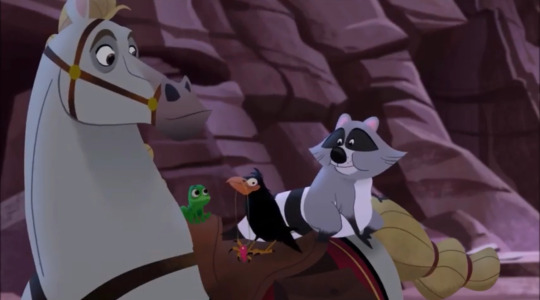
While perhaps not my favorite episode this season, Day of the Animals is easily the best written story of season three. Even so, it still has problems due to the third season’s poor approach to characterization.
Summary: Rapunzel, Varian, Angry and Red are returning stolen loot that the two girls had stolen years ago. They are accompanied by Max, Pascal, Ruddiger and Hamuel who all cannot stop quarreling with each other (or in Hamuel's case, just being useless). While messing with a sea shell pendant, it magically transports the humans into it, leaving the animals to fight over it. A minor thug named Dwayne, steals the pendant forcing the animals to work together to retrieve it.
So Why is a Polynesian Inspired Kingdom Within Riding Distance of a Northern European Country?
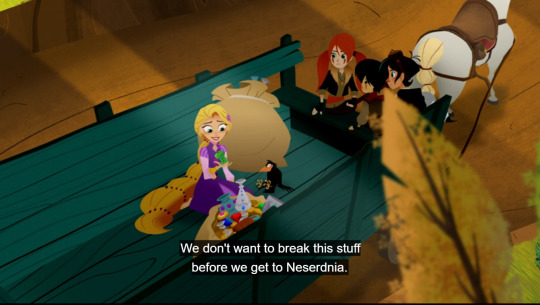
If you’ll remember my review of Beginnings, Neserdina’s princesses were wearing Polynesian garb and dancing the Hula when prepping for the competition. Now I’ve already went into length as to why that’s not good representation, but in addition to that it’s also just plain dumb. You can’t just transport one ethic group and dump them into another part of the world because it’s convenient for you. You don’t earn any brownie points for doing that. Especially when your fantasy world is still based off of our own historical earth.
To make things even more confusing, we actually saw Neserdina way back in season one in Way of the Willow. It’s where Willow bought the gremlin knock-off.

That is an island. How the heck do you get to a volcanic island riding in a horse and cart? And don't tell me they’re riding to a port, because Corona is a port city already. They could have gotten there by boat. It’s also can’t be too far away from Corona’s borders if Angry and Red were able to get there on foot during their year long travels.
The only explanation is that the entirety of the Tangled crew doesn’t understand geography, and this won’t be the last example in the show to back up that statement.
So Why Is Rapunzel Here?
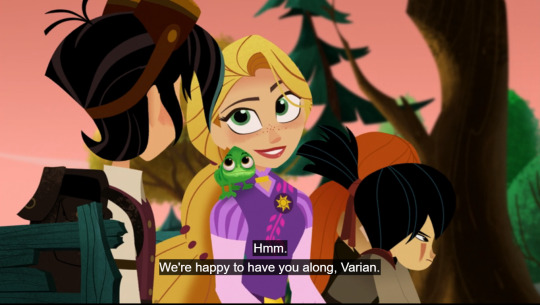
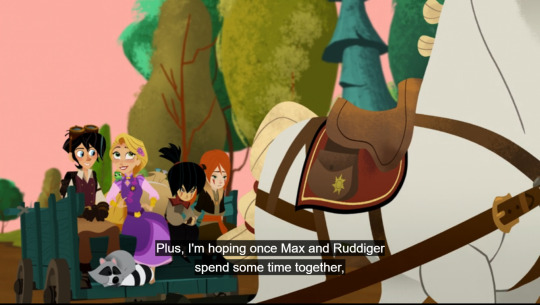
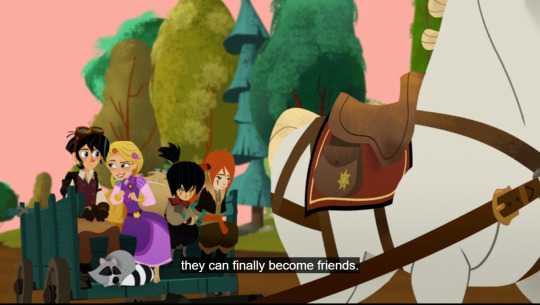
We get explanations for why everyone is on this road trip, except for the main character herself. Red and Angry are trying to return some stolen loot. Varian is wanting to pick up rare alchemy supplies at the market and was invited along because Raps hopes it’ll be a chance for Ruddiger and Max to get know one another better.
But why on earth does Rapunzel feel the need to come on this trip herself? Doesn’t she have a kingdom to run? While I’m sure Eugene is more than capable of handling things, this doesn’t reflect well upon the writers supposed plan of making Rapunzel appear more responsible.
Literally any other adult could have come along on this trip. This wasn’t something Rapunzel needed to waste time on. Lance especially would have been more appropriate here as he’s the one who’s suppose to eventually adopt Angry and Red. And the sad thing is, all they had to do was give Rapunzel a line about needing to attend some sort of diplomatic business in Neserdina. That’s it.
In a show that’s supposed to be all about Rapunzel; Rapunzel sure doesn’t have a whole lot of reasons to exist in the majority of the episodes.
Lack of Worldbuilding Strikes Again
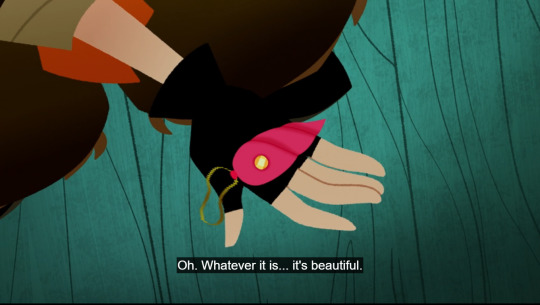
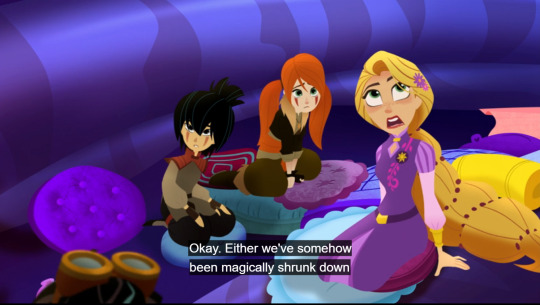
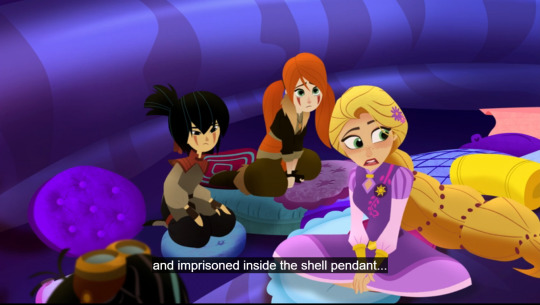
At this point I’m kind of numb to the whole “magical thing just exists for no adequately explained reason” and so I’m not as upset as some people are about the shell necklace. But it’s still not good writing.
Why does this thing exist? How did come to be cursed? How did it get mixed in with their stuff? What activated the magic and why did it only effect the human’s even though the animals were closer to it?
Just something show. Anything. You bothered to give use rules for how this thing works and even stuck to them this time, but you can’t just make the last leg of the trip and give us some exposition?
Yeah, okay.
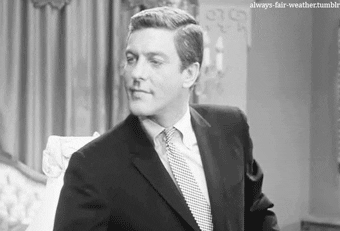
So Where Exactly Are We in Relation to Corona?
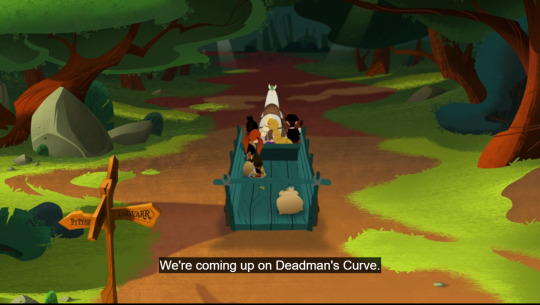
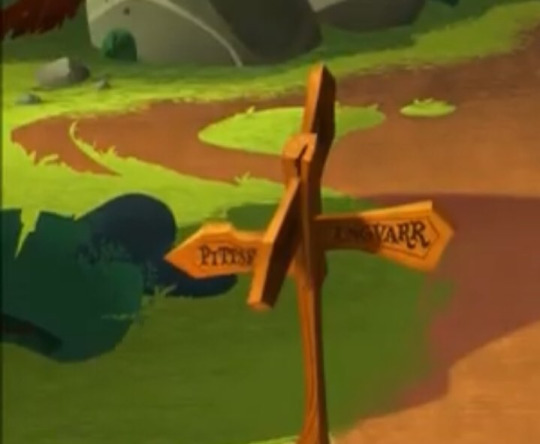
We can see Pittsford and Ivangarr on the road sign and we have to be in riding distance to Neserdina from Corona, but like are we in Corona still? Are we in Koto, which is Corona’s nearest neighbor to the east according to season three. Are we in some no-man’s-land where none of the kingdoms have control, or are we already in Neserdina itself?
The series gives us no sense of direction nor any firm placement for Corona within it’s world. I only know it is a Northern European country because Corona itself is a peninsula with a north sea, uses French, English, and German fashion/customs, and Rapunzel is a Germanic fairy tale. But like those clues are thrown into a blender and contradicted several times over, on top of never being told where it’s closest kingdoms actually lie.
All of this matters when traveling and exploring the wider world are big themes of your show. You need more solid and consistent world building than this. It also impacts how much authority and control your main character has within the episode itself if she range of political power is limited to one area. So like we need to know where the heroes stand here.
(FYI I personally headcannon Corona as former Prussia which was once part of Germany and it’s alliance of smaller kingdoms. It’s also a peninsula next to the Curonian Spit)
This Is Not Progress
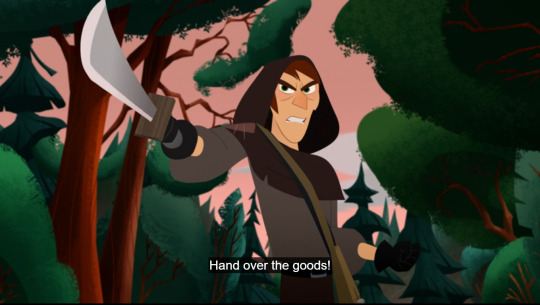
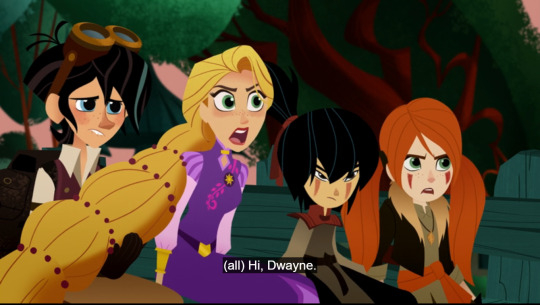
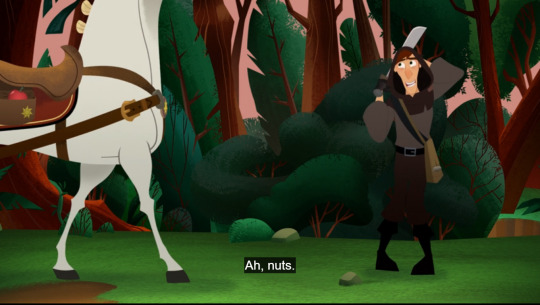
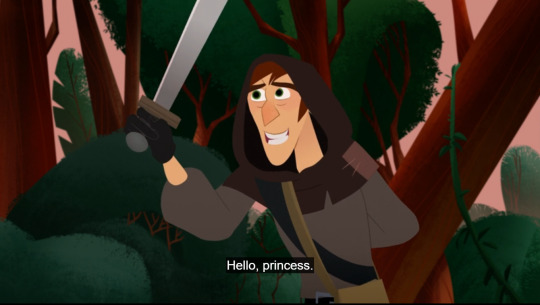
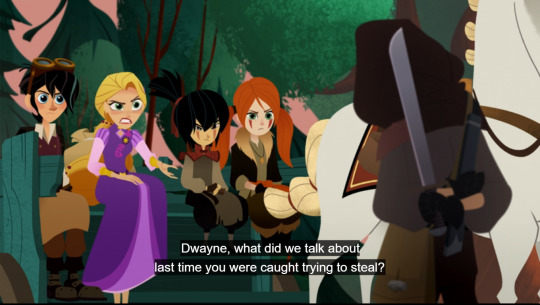
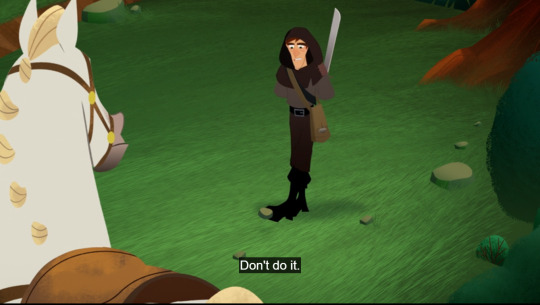
Okay so the idea here, is that the show is implying that Rapunzel is trying to improve Corona’s justice system over Frederic’s previously inhumane crack down on crime. However, this is terribly executed.
For starters the show has never called Frederic nor Rapunzel out for their previous misbehavior. You can not change any system for the better without acknowledging the flaws within said system first. Therefore this comes right out of nowhere and doesn’t stick around long enough to stay within the viewers minds for later.
Secondly, Rapunzel is incredibly fickle about who she does and doesn’t set free. The Saporians were still in the dungeons last time we saw them, Caine was shipped off to the prison island and left to die there as far as we know, and the Stabbingtons are shown shackled together in the wedding short even though they supposedly changed their ways and befriended Eugene again.
Meanwhile Dwayne and Stalyan are free to go their marry way and continue their life of crime, Varian is only released from his overly harsh punishment because he kissed Rapunzel’s ass not because it was wrong to imprison him in the first place, and later Cassandra gets away scot free because she’s Rapunzel’s bestie even though she committed the worst crimes out of everyone in the show and for very little reason.
That’s not justice. That’s not compassion. That’s not progressive reform. It’s just nepotism, and it’s every bit as corrupt as Frederic’s classism and totalitarianism.
Just because Rapunzel is “nice” it doesn’t mean that she is kind. Real reform has to treat everyone with equality and have a set of base standards that are beyond one person’s personal judgment. She is still a dictator and an abuser even if she lets the occasional person go free on a whim.
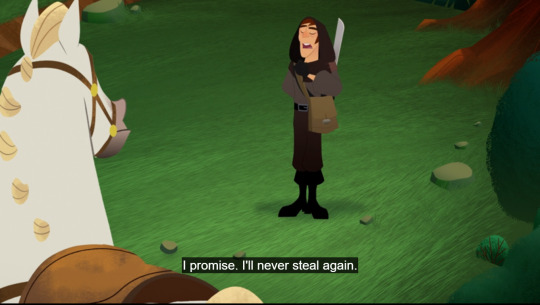
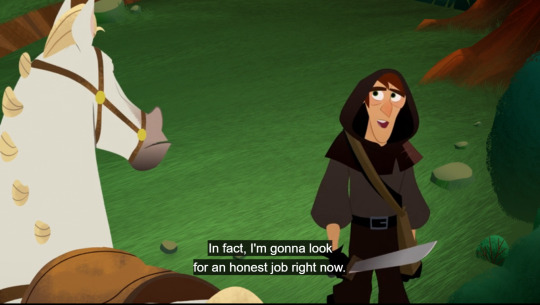
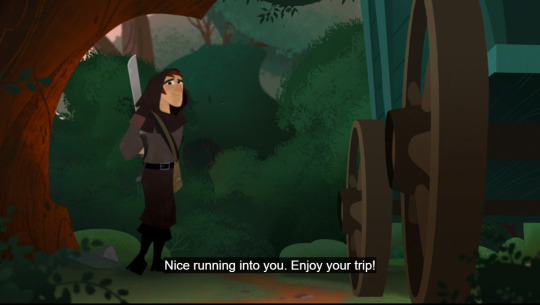
Finally, Rapunzel’s methods are just downright ineffective. Dwyane may not be a threat to our heroes, but that doesn’t mean he’s not a threat to other people. He’s not actually sorry about trying to rob people at knife point and he fully plans on continuing being a thief after feeding Rapunzel the lines she wants to hear.
Furthermore, we don’t know if this course of action is born out of malice or desperate need. He half heartily comments about finding ‘an honest job” but can he even do that? Is it even a realistic option for him? The series has been weaving this class inequality theme through out it’s past three seasons and directly connecting that to Corona’s crime rate.
Eugene had a hard time finding a job during season one directly due to his past record, remember? A life of crime he was forced to lead in order to survive, and he’s the Prince Consort! What chance does Dwayne have? Did Rapunzel even try to help him find work or did she just wag her finger at him and told him “Now, now, stealing’s not nice.”
The show wants to act like Rapunzel is this progressive reformer but then they turn her into a Republican instead. That’s not me being sarcastic either, this approach to criminal justice is the foundation of conservative belief and has been for centuries. The right are not interested in why people commit crime. They don’t care about addressing the fundamental problems in society that lead people to break the law. Let alone bother to analyze why those laws exist in the first place. Instead they resort to doublethink and survivor bias to either write off those that fall through the cracks or make excuses for why their policies repeatedly fail, often ignoring the fact that things aren’t actually working for whole swathes of people who aren’t themselves.
Tangled the Series is far too simplistic and childish in it’s approach to deeper subjects like this to enforce the messages it supposedly wants to enforce. Rapunzel herself relies on magical thinking, double standards, and personal bias to see her through every and any problem and the show just rewards her for it rather than challenging her to grow and in doing so winds up supporting people like her in their authoritarian ideas, whether that was the writers’ intentions or not.
In short, Rapunzel shows no interest in putting in the real work it would take to implement genuine restorative justice. She doesn't honestly care about Dwyane or his victims. She’s just posturing here for the sake of her self image.
You’re Not In Any Position to Talk Rapunzel
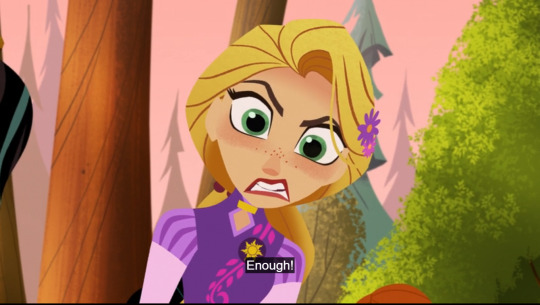
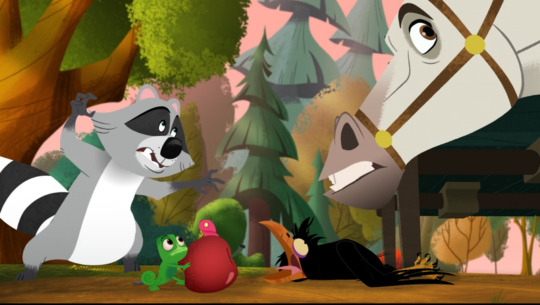
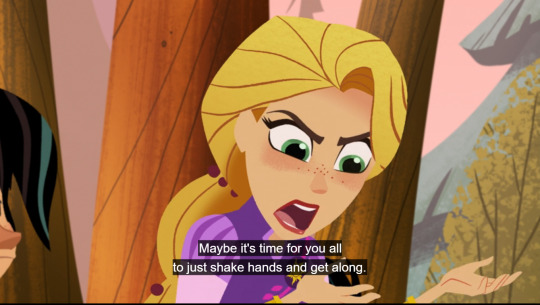
Speaking of Rapunzel being a hypocrite.... The entirety of season three’s main conflict is her having a petty bitch fight with her supposed best friend and needlessly dragging everyone else into it.
In fact that’s the whole show. Rapunzel repeatedly failing to get along with other people because she’s deep down a shitty person despite the veneer of ‘friendliness’ she slaps on to hide it. Having her just say she knows better does nothing to convince me that she’s actually learned anything. You have to show that she’s learned it first, and that requires acknowledging her own wrong doings.
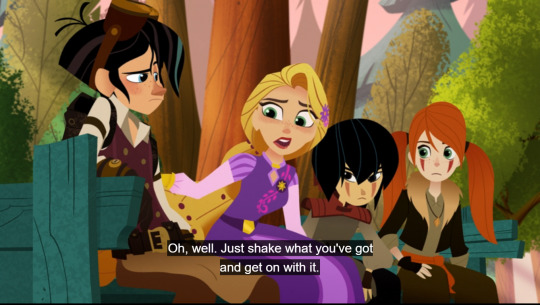
Varian’s face here just tells it all. Rapunzel is full of shit and no one in the show knows it better than him. Why are they even friends again? Why should we trust her with the three kids she neglected more than once? Why should any of these people take what she says seriously?
Well This is Contradictory
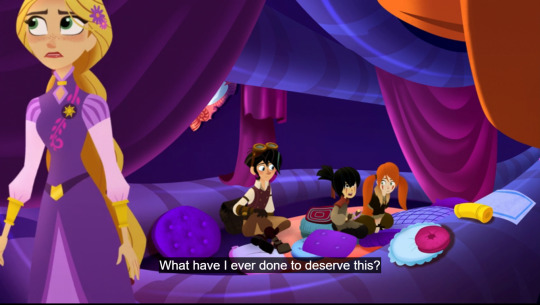
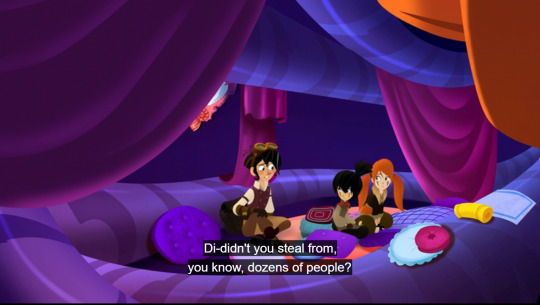
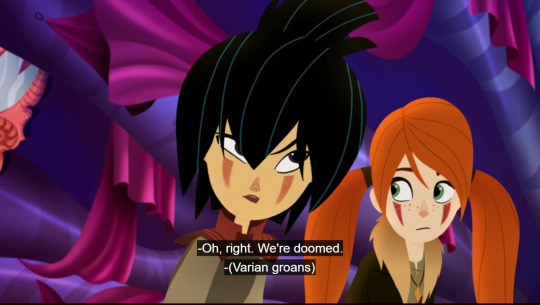
Also, since we brought up double standards, here’s Varian undermining that whole “jail is bad” thing Rapunzel is trying to push with Dwayne and later with Cass. Not only is the show under cutting it’s themes for a joke, but it just reinforces the abuse Varian received. He’s now bought into Frederic’s stupid beliefs and winds up reinforcing to the audience that that his ‘reform’ was due to his past imprisonment.
As an adult watching this series, Varian’s supposed redemption continues to increasingly look like a victim complying with their past abuser out of fear of further harm rather than anyone genuinely learning to be better.
Can We Please Stop Infantilizing the 16 Year Old
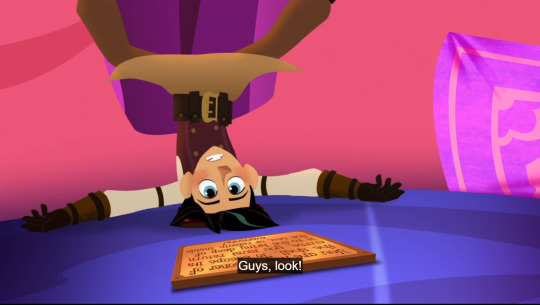
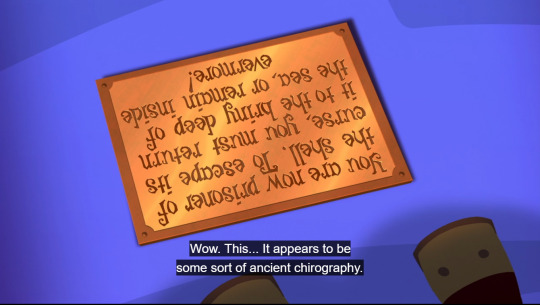
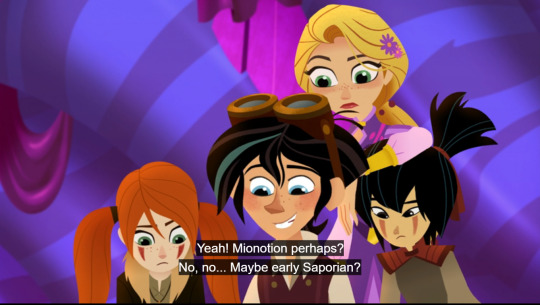
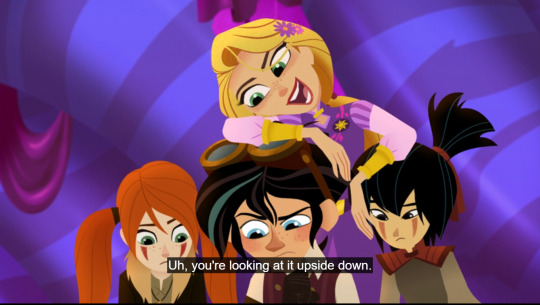
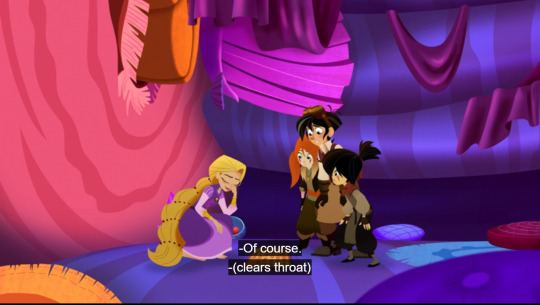
As if to deflect from Varian’s past mistreatment and continuing parentification, the show then goes on to showcase the opposite extreme whenever possible. I know it’s hard to tell just from these few screen shots alone, but over the course of season three Varian is spoken down too and treated condescendingly by the rest of the cast, and by Rapunzel in particular, even as he enters his later teens/early adulthood.
Some of this is just to due to Rapunzel being her usual holier than thou self, but there’s also times, like here, where Varian is lumped together with the actual children of the show, even though he’s 6 to 8 years their senior.
In fact out of everyone Rapunzel interacts with, Varian’s actually the closest to her in both age and development. Queen for a Day forced the two of them into a power imbalance due to a mixture of classism and society’s ongoing unhealthy (and often artificial) divide between younger and older teens, but as we get further and further away from that point in time and as Varian nears the same age Rapunzel started out as, that imbalance becomes less and less relevant.
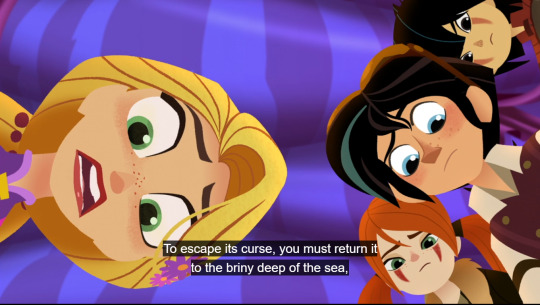
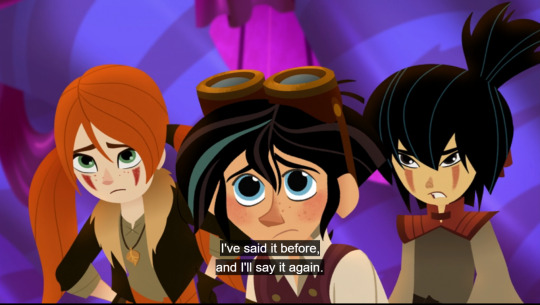
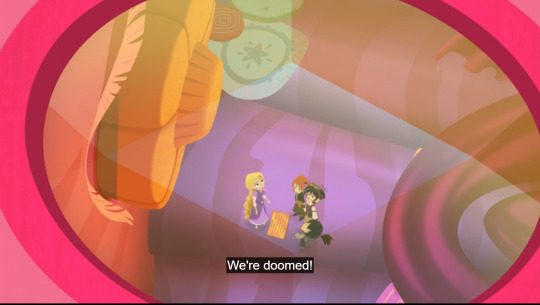
Look at how this scene is framed, He’s standing between Angry and Red and is placed lower than them to make it look like he’s one of them. He’s not.
Varian may still look 12 with his big old eyes and short stature, but seeing as how we’re past Hearts Day, he’s actually close to being 17, if he isn’t already. The timeline gets even wonkier after The King and Queen of Hearts, but trust me, we’re close to being two years past Queen for a Day, if not more so.
Varian, for all counts, should be Rapunzel’s equal by now in terms of story. Not only is he closest in age to her, but he’s also the only other person going through a coming of age arc. And of the two, Varian’s the one who has actually learned and grown as a person. He has more real world experience than Rapunzel ever will and knows how to implement that experience. (He’s also the more mature, but that’s more of a failure to write Rapunzel competently than a reflection of his capabilities.)
No matter how you slice it, Varian shouldn’t be taking orders or advice from Rapunzel; no one should be, really; and he most certainly shouldn’t put up with her condescension. Rapunzel is not his nor anybody else’s mother. She’s not even a big sister like figure, and at no point should be treated as the leader of anything or anyone.
Rapunzel is a Poor Man’s Rose Quartz
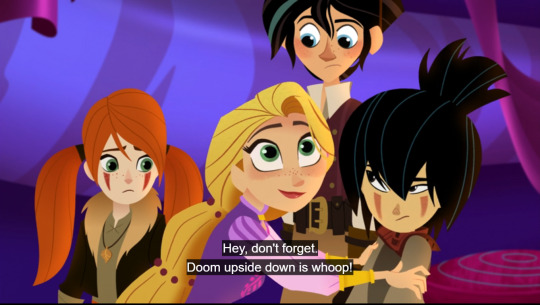
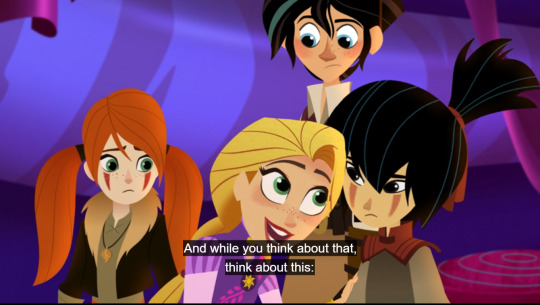
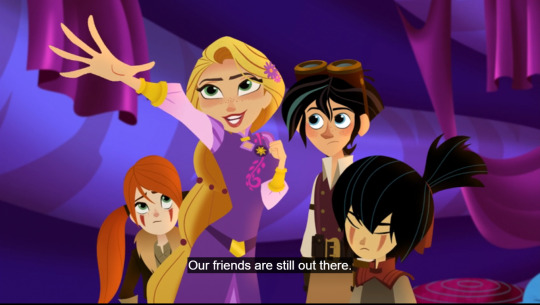
I typically try not to draw too many comparisons between Tangled and other shows outside of the occasional parallel, as a show should be able to stand on it’s own for good or for bad, but it’s hard not to discuss the series without also discussing Steven Universe in some way.
Steven Universe is this generation’s Batman the Animated Series or Scooby Doo. It’s the game changer that everybody else is trying to copy in some manner. Chris desperately wants Tangled the Series to be the next Steven Universe, right down to how the show is structured, paced, and what themes are presented. But unfortunately Chris has no idea why Steven Universe works the way it does.
For starters SU adjusted it’s pacing as it went along, smoothing out its rougher edges while Tangled doubled down on its filler. SU had a planned arc from the get go and stuck to it, so that by the time the twists came they made sense. SU kept it’s focus on Steven purposefully so that the story unfolded from his view point while making to sure to acknowledge the importance of other characters around him and their conflicts. It didn’t make him infallible nor shove aside everyone else’s arcs.
But most importantly, Steven Universe was written by a bisexual nonbinary person who set out to make a show for people in the queer community like themselves. Meanwhile, as a middle aged white man, Chis hasn’t a damn clue about his primary audience and has shown no interest in connecting with them.
This isn’t to say that Steven Universe is a perfect show. No show is beyond criticism. Nor is this to say that straight white cis men can’t write; many of them do and can portray characters unlike themselves competently enough. But if you’re completely disinterested in other points of view than you can’t be a good writer of fictional stories, that’s just a fact. Because in order to understand proper characterization you need to acknowledge that not every character ever will be like you and that even you’re main heroes will hold beliefs and experiences different from yourself. Otherwise there is no genuine conflict to build off of. Either no one will disagree with each other or the conflict will come across as flat and forced, complete with lopsided bias.
Therefore, in the end, Rapunzel winds up being less of a Steven and more of a Rose Quartz/Pink Dimond. Both are spoiled princesses/co-rulers of a kingdom that mistreats it’s people and anyone outside of it, who rebelled against their guardians, supposedly out of a sense of justice, but really for themselves and their own freedom, only to make things even worse for everyone. On top of that they both accidently harmed their friends, freindzone their best friend while also bossing them around, are condescending to their love interests, is controlling of people who trust them, and throws temper tantrums when they don’t get what they want, oh and neglected someone for an inhumane amount of time.
Even then, Rapunzel winds up being the worst of the two.
The whole point behind Rose was that she is someone whom the main characters place upon a pedestal and as the series went along slowly had the scales fall from their eyes and learned to view her for who she really was flaws and all. By the end, in Future, she is even metaphorically removed from her pedestal when Steven removes her picture from the wall.
Rose also grows as a character, unlike Rapunzel. Her story is deliberately being told to us backwards. The awful person she was in the past was no longer who she was by the time of her death. True she was still flawed, and the consequences of her actions continued on even after her demise, but she actually tried to be a better person. She got called out for her behavior, she wasn’t excused for actions even when the show explained why she did what she did, and she stopped doing harmful actions whenever she realized that they hurt someone.
Greg was allowed to stand up to her and show how she was wrong, and she respected him for it and later fell in love with him because of it. She tried to better control her temper when she wound up hurting her friend. Her failed revolution and her mistreatment of Spinel was actually born from a misguided desire to help, rather than outright selfishness.
Rose Quratz/Pink Dimond is a brilliant fucking character. You may not like her, but you can’t deny that she is one of the most complex figures in children’s media to ever be created. She is real, nuanced, and multifaceted. He role within the story is complicated, messy, and intricate. She is the most well rounded female character I’ve ever seen and she is what I had hoped Rapunzel would be when I first watched season one, only even more so as the actual focus.
I want women in cartoons to be people!
But Rapunzel fails at every turn to follow through with this promise. She is not a deep complex character. She’s not a flawed and complicated heroine. She’s a blank canvas in which the creator can shove his creepy ass views upon. She is never taken off her pedestal, she’s never allowed to be wrong, and she is forced to spout the the creator’s personal bias against other characters.
Rapunzel isn’t a person. She had the chance to be one, but then was reduced to .. to this. As a woman, the treatment of Rapunzel and Cassandra in this show is just flat out insulting.
So What Is the Difference Between Angry and Red Now?
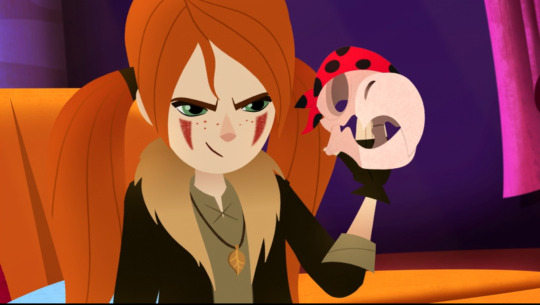
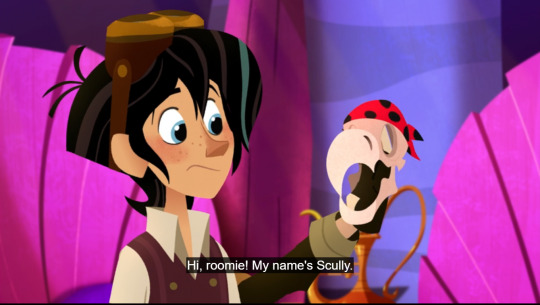
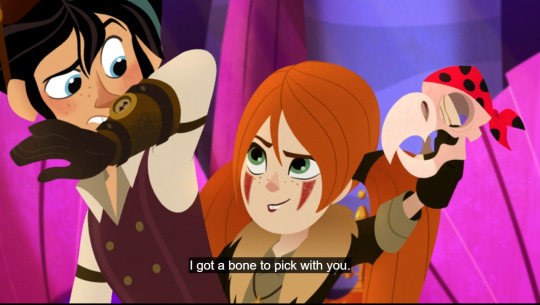

I’m all for character growth, but at this point Angry and Red are just interchangeable. Anything that made them uniquely them has been lost, and they’re now just fulfilling the generic rambunctious little kid trope. Red becoming more assertive shouldn’t mean she stops being an introvert altogether; that’s not how that works. While Angry shouldn’t lose her temper completely just because she’s wiling to open up more.
So Why Dwayne?
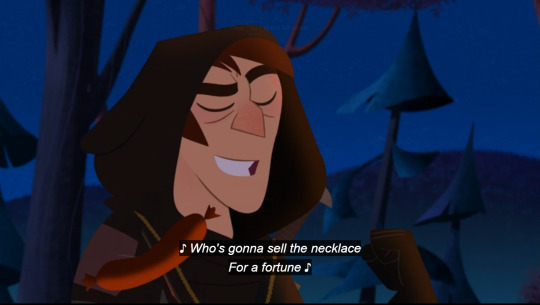
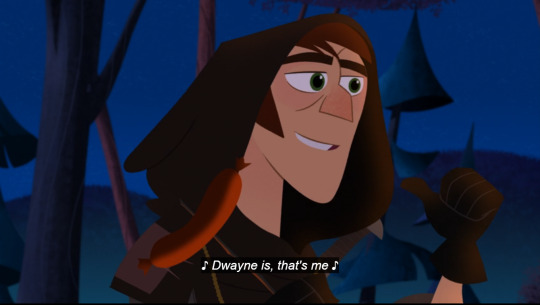
I like Dwayne as a character and in truth I don’t mind his existence here, and unlike that werewolf hunter last time he at least was established in a pervious season. But this is still time that could have went to a more important antagonist.
Also notice that Dwyane gets a villain song, but not Lady Caine or Zhan Tiri. Just saying.
Rapunzel Has Not Earned the Role of the Wise Sage and Mentor
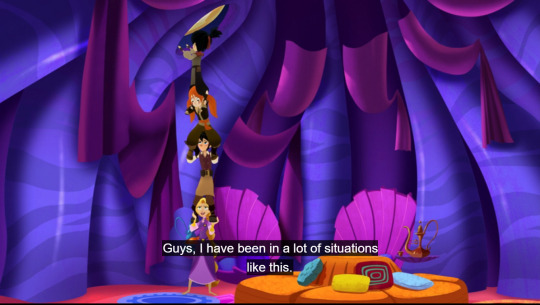
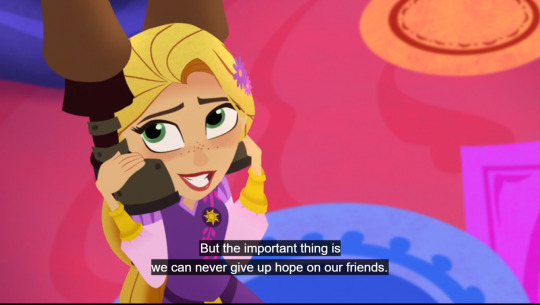
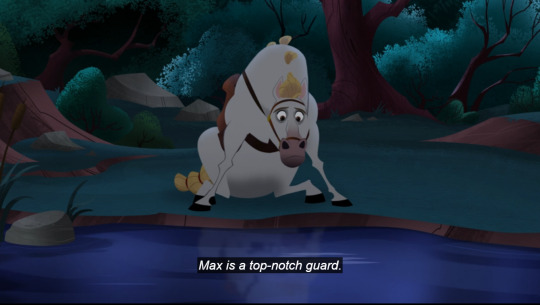
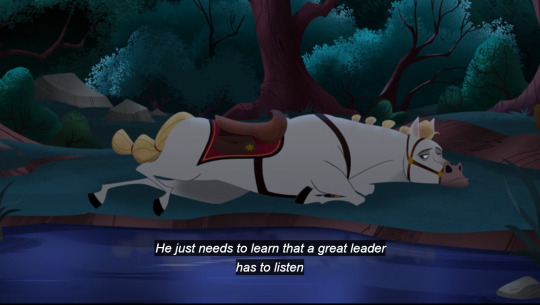
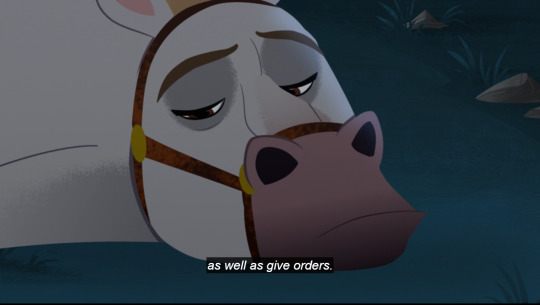
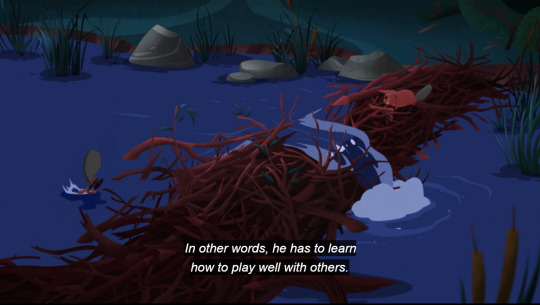
Rapunzel has never learned to listen to others. Ever.
On it’s own this might have been a good speech, but when taken in context of the wider story it just makes Rapunzel look like an ass.
A year traveling does not make Rapunzel suddenly all knowing. She is not wiser nor more experienced than anyone else in this scene. She’s also a crappy leader and big fat hypocrite.
Even when she’s technically right, as seen here, she’s still in the wrong because she never follows through and acts upon her own advice; making this whole story pointless in the grand scheme of things.
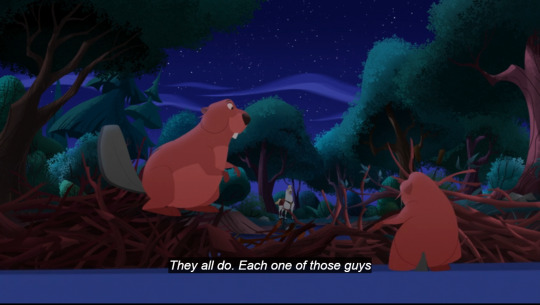
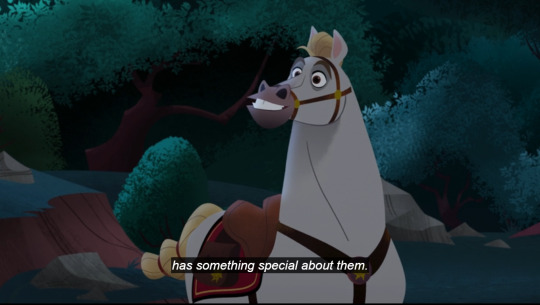
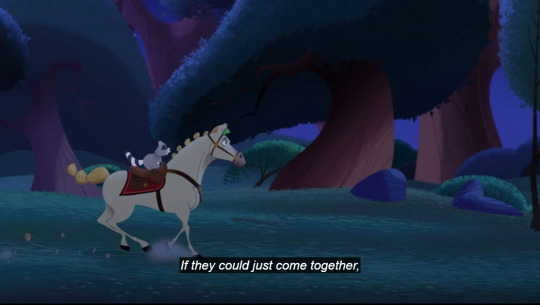
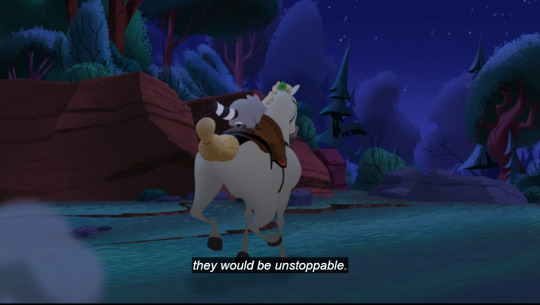
And that’s the core problem with season three. Rapunzel is shoved into a role she is not designed for and the whole premise of the series runs right off the rails. You’re main heroine in a coming of age story can not inhabit the mentor role. She can not simultaneously learn and grow and be always right while instructing everyone else.
All through out season three Rapunzel is either rendered completely useless in her own damn series, or she utterly fails to fulfill any sort of narrative promise laid out for her while she infuriatingly hijacks the story from more interesting and dynamic characters.
Behold The Only Reason Why Varian was Included in the Episode
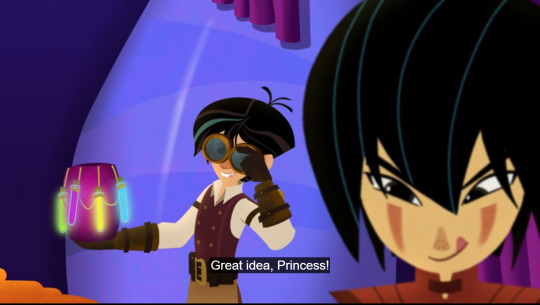
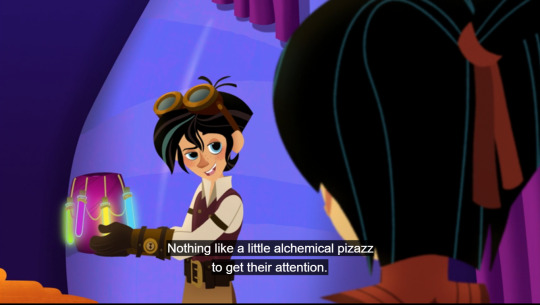
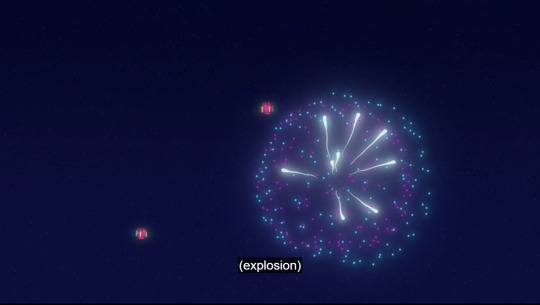
Speaking of hijacking things, Rapunzel of course has to get the idea to save everybody, even though what she thinks of isn’t anything special. It’s not derived from her character as an individual nor from all that experience she supposedly has. It’s literally an idea anyone could have come up with and the show just hands it to her in order to justify her exitance.
Meanwhile the character who actually is useful to the plot is sidelined and reduced to just a plot device. And not just here, Varian is rendered practically pointless in all but two episodes in season three, even in episodes that he actually should have more impact in, like the season opener and series finale.
Good writing treats characters as equally contributing to the plot in ways that complements who these characters are.
Ok I’ll Admit That This Line Is Funny
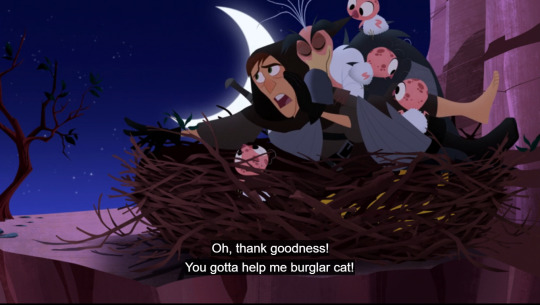
Look, I know this whole review series is about pointing out the negative, and I stand by my opinion that Tangled the Series is one of the worst written shows I’ve ever seen, but I want to make one thing clear.... I do not hate the show. If I hated the show I would not waste my time reviewing it.
Yes the over all writing is shit, but there are a lot of good things to be found in the series beyond just the crap story arc. The humor is usually solid, the animation is gorgeous, the music is a delight, and the majority of the characters are likable even though they don’t develop in the ways that they should. There’s a lot of talent that went into this show and there’s a lot of potential to be had in it’s set up and lore.
Being critical or negative about the aspects of something doesn’t mean you dislike it, or that you’re not a real fan, or that you’re just a ‘hater’, and I actually find TTS to be fascinating because it’s such a mess. I write reviews because they’re fun and because I genuinely think there is something to be learned from Tangled’s mistakes.
So Why Do We Cut Back to Rapunzel Here and Not Varian?
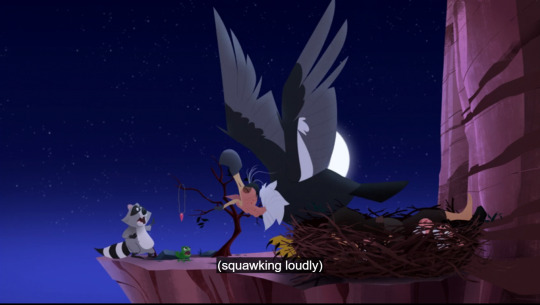
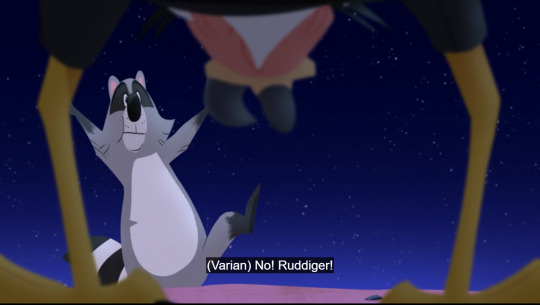
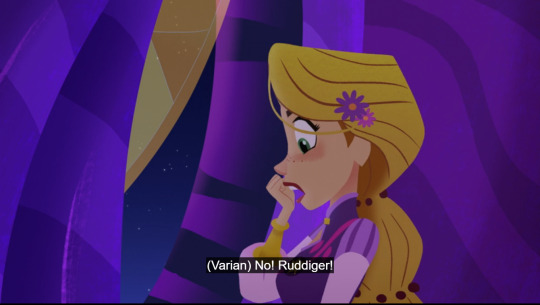
This is such an odd framing choice. Varian is the one who is talking and reacting to what’s happening. It’s his pet that’s in trouble and therefore he carries the emotional weight of the scene, and yet it’s Rapunzel’s shocked face we focus on? Why? What’s the point of that? She has no business being the center focus here. The action does not involve her.
If you wanted to include her for a later set up then why not have both her and Varian present in this shot? Usually I can at least count on the story boarders to frame things better than this, but they really missed the mark here. Unless Chris is just that stupid and petty that he over ruled them and forced Varian out of the scene, but that seems like a pointless fight to pick, even for him.
See This is How you Fulfill a Narrative Promise
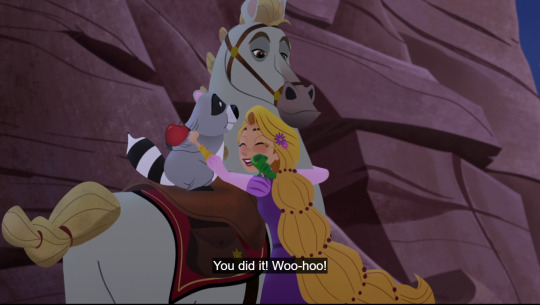
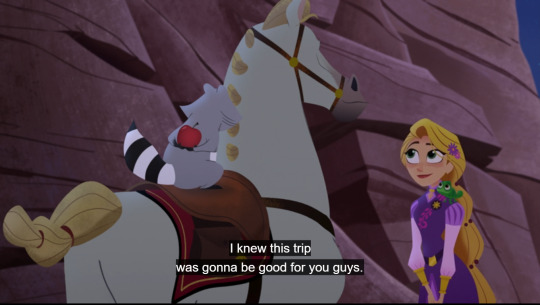
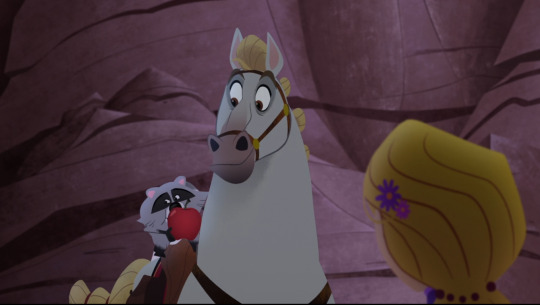
The conflict between Ruddiger and Max was set up in season one with What the Hair, then it was reiterated a few episodes ago during The Lost Treasure of Herz Der Sonne, and then it was reintroduced in this episode along with a stated lesson about working together that they needed to learn. By they end of the episode, guess what, they’ve learned to work together. That is how you properly set up and resolve a conflict.
It’s clear from this that the writers of Tangled the Series know the basic tenants of writing and how to fulfill narrative promises. So the fact that they don’t follow through with this in the majority of the show’s episodes and ongoing story arcs just baffles me.
Is it negligence? Is it hubris? Is it incompetent management and editorial mandates? Is it just one asshole ruining everything or is this a failure in the writers room as a whole?
I just don’t understand what the fuck went wrong here. There’s no reason for why the show got as bad as it did. How does the most acclaimed animation company in the world put out such amateurish tripe?
Just... wow.
Now you know why I’m mesmerized by this show. It is a mystery to be solved, like trying to figure out how the crew on the Titanic fucked up so badly or why Hindenburg blew up. You just can’t look away.
Conclusion
Like I said at the start, structurally speaking this is the strongest episode of the season. I personally enjoy Lost Treasure a little more, just because Rapunzel annoys me less in that, but it’s not a bad story. However when you’re best episode in your final season is filler, then you know you’re in trouble.
If you like my reviews and want to support my writing endeavors you can drop a tip in my kofi https://ko-fi.com/rachelbethhines
57 notes
·
View notes
Text
I listened to the TAZ Grad finale!
Fellas is it gay to become imbued with the essence of the sea after influence from your water genasi teammate, pester said teammate afterwards to name a boat after you, and sail away with them into the sunset to run a cruise line scam and become morally righteous pirates?
Ive been looking at people’s reactions on the finale and yeah I loved the chaos magic parts! The whole issue with the mishandling of D&D mechanics was never really a problem with me, although I know some people feel more strongly about that than I do.
Personally, I’ve always listened to TAZ for the story and not the actual D&D so I never really took issue with any of the DM-ing mistakes Travis did. Parts of the actual story had problems (the centaurs, Ranier, other points where Travis tried to be inclusive but implemented it where it wasn’t relevant) but overall I think the enjoyable parts far outweighed the bad.
And the McElroys in general are funny as hell so even though Grad wasn’t as profound as Balance or as sad as Amnesty I still enjoyed it a lot! I would probably put Grad above Amnesty but below Balance, but of course Balance holds a special place in my heart.
A problem people had with the finale that I didn’t notice while listening was that of all their talk of “destroying capitalism,” the trio settled down to comply with capitalist society at the end. And while I do agree that the “this system is bad but let’s slowly make change from within” message has been done to death, I don’t think that the ending was necessarily performative and disingenuous on the McElroy’s part.
The first point is that even though the trio decided to participate in Nua’s society in stereotypically “exploitative” careers, (particularly in Fitzroy and Firbolg/Gary’s case) they did so explicitly to keep people from being exploited by the system. Not to mention their paths fit their character arcs pretty well.
Fitzroy’s “who will protect the weak from the strong” speech doesn’t indicate a sleazy lawyer willing to exploit the law to make a quick buck. One person described him as one of those pro-bono lawyers and I agree with that comparison. Fitzroy is a morally good person at his core, and he initially thought the hero society would help him do good, and after becoming disillusioned with hero society, he decided to carve out his own system to allow him to do good, both by being a lawyer and by being a pirate that only attacks rich assholes. (I really like that he clarified he would only attack rich assholes my chaotic good lawyer boi <3)
Firbolg’s whole character arc of being conscientious of resources to help the community instead of hoarding things to himself, in my opinion, culminates neatly with his decision of becoming a financial advisor. He has learned that both the “share all your resources without regard for the future” ideals of the Firlbolg and the “hoard all your resources for your own benefit” ideal of Nua’s society are both flawed extremes, and has dedicated his career to helping communities find a balance between the two.
Argo’s cruise seems more of a small business to me than a capitalistic venture, but I have never taken an econ class in my life so I digress. His character arc was about finding something to live for other than the past and I think it’s a good conclusion to his arc that he commemorates his mother and friends with the cruise line but still seeks out his own future outside of that by becoming a pirate. His original plan was to go with the establishment and work with one of the most powerful heroes in the world until he gets revenge, so it’s nice to see him grow to find his own self sustaining outside of the establishment.
The second point is that TAZ Grad was never about destroying capitalism. That was a joke that Travis laid the foundation to, but it was the players who made that joke and rolled with it. Tumblr user @fitzroythecreator wrote a really good analysis of how the main theme of Grad was self reliance which I agree with. While that is one of the main themes, I will be focusing on the theme of capitalism that a lot of people tend to focus on.
The characters’ goal was to destroy the HOG, which was an allegory for how organizations function under capitalism, but never a direct parallel with capitalism as an ideology or functional system itself.
When they first joked about “ending capitalism” by blowing up the HOG I was concerned because that’s not how anything works. The HOG was just one cog (heh) in the capitalist machine that was Nua’s society, and while destroying it would cause significant damage and change, it wouldn’t immediately shift everyone’s worldviews to discard their capitalist society as a whole. If the boys carried out the mission and all of a sudden the whole world was fixed, it would be even more disingenuous to present a utopian solution to a pressing, real world problem that simply cannot be solved this way.
I’m glad that they didn’t end capitalism. Social issues like this can never realistically be resolved by three spunky heroes on an adventure. You would need action from an entire population. Often violent action. There were already issues with too many NPCs in the spotlight so describing and entire population’s uprising would have exacerbated the problems even more. As four white men, the McElroys neither had the answers for how to end capitalism, nor would their medium of a D&D podcast have allowed them to present them effectively.
From my perspective, the way they would have actually ended capitalism was to go to war like Chaos and Order wanted. In this case, the entire social order and way of life for Nua would have been overturned. The main characters, Fitzroy most vocally, reject this option because of the human toll (or elves, or dwarves...whatever the term for that is for D&D races). Instead, they disturb the system to expose its flaws and let society recognize said flaws in the background. (Again, they couldn’t focus too much on it as it would take away from focus on the main characters.) Then, they choose to find their own place in the system and fix it from within.
I’m not surprised that the McElroys would pick the “change the flawed system from within” route over the “use continuous and possibly violent action to force rapid social change” route in the end. While the second stance could work if written correctly, there’s a lot more room for the message conveyed to be catastrophically bad if the writing doesn’t work. I’m personally glad that the McElroys, who don’t have a solution, presented the tamer first take instead of trying to give a solution with the second take and failing spectacularly.
TAZ: Grad was social commentary on the problems of late stage capitalistic society, but it never tries to present a clear answer on how to end this society. Rather, it recognizes that this is a problem that can’t be solved by one small group of people. It presents several possible solutions to navigate this society to bring yourself happiness within this soul crushing system while slowly changing the attitude of the society. After all, if everyone quietly changed societal attitudes for the better, then perhaps one day the population will be united enough to bring about the drastic social change that we all hope for.
#taz: graduation#taz grad#fitzroy maplecourt#argo keene#taz firbolg#SHUT UP JESSICA#this is the kind of analysis i do with media when im bored#except none of my friends that i share my bad takes with know about taz grad so#its your problem now
45 notes
·
View notes
Note
do you think the sns ending came at the cost of sasukes character development. I feel like kishi set up so much stuff and so much internal conflict within the village and the politics of the Shinobi world which was the driving force fo all the characters motivations and plot but that was then put aside to serve the alien reincarnation plot.
I feel like sasukes internal conflict and development was put on hold to serve the new plot line and cast him in a whole different light because Naruto was always going to win and be the light to sasukes darkness, instead of sasuke having very legitimate points throughout the series. Naruto doesn't undergo any significant character change so his goal will stay consistent until the end which puts him at a cross roads with sasuke who has to change and be the bad guy in order to accommodate Naruto and end the cycle of hatred which really isn't his fault anyways. like it aint a mistake that the uchiha massacre and the hyuuga slavery isn't acknowledged because that would redirect the focus on the internal village darkness and the systemic flaws instead of the curse of hatred. idk:/
absolutely. like itachi said, sasuke is like a blank canvas and can be dyed to any colour, but it seemed kinda strange to see sasuke's character to take a complete u after vote2.
vote2's conclusion was sasuke finally understanding the pain naruto went through, from being condemned by the state to chasing after the him, a criminal despite it all. it ended with nart ending sasuke's curse of hatred, but that really doesn't explain how he just put an end to all his goals he had sworn to execute to avenge everyone he lost and end the prejudices of the shinobi world.
from absolutely despising the state to wanting to reform and recreate it without all those who caused pain to his kin was the peak of his development. protecting the state after everything that happened doesn't justify how sasuke, a really goal-oriented person, decided to let it be and move on from his past.
the ending was super rushed (and we know that) cuz sasuke still had much more to display. i feel the dark side of the shinobi world was set up just to be fixed by someone (sasuke addressed that too vs naruto) but that plot was completely abandoned. and his character development would've been more gradual and believable if he actually carried out the plan, in which he might have gone through a journey of self-discovery without any of his obstacles.
#sins#I'm sorry I can't write anything for nuts#sasuke going from anti-state to anti-government to pro-state in the span of 2 days was prolly the most unbelievable parkour ever#we really need an alternate ending to naruto where sasuke actually did what he had planned#or evena self-discovery arc#sasuke shinden really had the potential to be that arc or a character redemption arc#but we got him owing allegiance to the state and finally being forgiven for his#pro sasuke#sasuke
5 notes
·
View notes
Text
Conservatism in Brandon Sanderson’s Writings; or, Reflections on Revolution in the Cosmere
I’ve only read The Stormlight Archive and Warbreaker, so this is based on an incomplete picture, but the combination of those two have given me an impression of Sanderson’s ideas on social structures, appropriate and inappropriate responses to institutional injustice, and revolution. These ideas strike me as being essentially conservative; I’m tempted to say Burkean (hence my alternate title), but I don’t know Burke’s writings well enough to be sure if that’s correct.
To be clear: this is not a ‘call-out’ post. I personally disagree with some of Sanderson’s themes, but I’m trying to understand, engage with, and debate them, not flatly condemn them.
My interpretations here are primarily based on two storylines: Warbreaker, and Kaladin and Moash’s arcs in Words of Radiance. Both of these two storylines, and their resolutions, seem grounded in the following political ideas:
1) Injustice and cruelty are the result of bad, or flawed, people; not of bad systems. And people can change. The solution to a system that seems unjust is to improve the people within it, not to tear it down.
2) Those who seek revolution are basically self-serving and vengeful, not interested in the good of others or that of society.
3) Radicals and those who seek revolution have a blinkered political perspective, flattening societies and people into stereotypes rather than acknowledging their complexity.
1. People, not systems
For the first point: both Alethkar and the world of Warbreaker have systems that are fundamentally founded on entrenched and institutionalized inequality. In Alethkar it is the division between lighteyes and darkeyes (and the different ranks thereof). In Warbreaker it is the position of Returned, who can only exist by daily taking life-force/spirit from others - typically from the poor. Nonetheless, the narrative justifies the maintenance of both systems, primarily on the basis that the ruling classes contain good people (e.g. Dalinar, Adolin; Siri, Susebron, Lightsong); one of the major themes in TWOK and WOR revolves around forcing Kaladin to recognize that some lighteyes are good, and others, like Elhokar, have the desire and capacity to improve.
The basic political conflict is, to me, expressed by two lines following Kaladin’s (second) defeat of a Shardbearer. The first is Dalinar’s, when he states what Kaladin should do about institutionalized discrimination against darkeyes: “You want to change that?...Be the kind of man that others admire, whether they be lighteyed or dark...That will change the world.” This fundamentally rubs me the wrong way - it’s the Booker T. Washington theory of how to address racial inequality, and history has proven time and time and time again that it doesn’t work. If Kaladin did that, people would say, “Wow, that Kaladin, what an unusually exceptional darkeyes!” and continue to treat the rest of darkeyes just the same.
The second line is Kaladin’s when he refuses the shardblade that would make him lighteyed: “I don’t want my life to change because I’ve become a lighteyes. I want the lives of people like me...like I am now...to change.” This, I completely agree with - but later events would suggest the narrative may not. (And the fact that Kaladin doesn’t used his increased status in later books to push for change on this front frustrates me.)
To give another example: when Sadeas treats bridgemen as cannon fodder and their lives as utterly disposable, the problem is treated as being that Sadeas is a bad person (and facing certai. tactical constraints) - not the fact that Sadeas and the other brightlords has the power to treat darkeyes’ lives as disposable in the first place. When Kaladin is imprisoned for challenging Amaram to a duel - in effect, imprisoned for being darkeyed, since a high-nahn lighteyes would not have been punished for issuing such a challenge - this is treated as Kaladin’s fault, not the fault of a system that treats him as having fundamentally less worth than Amaram.
There’s no focus in the books on getting rid of the unjust system - by any means, violent or non-violent, bottom-up or top-down - just on having the ruling class become better people, which is expected to alleviate some problems without fundamentally altering the social structure.
2. Revolutionaries are selfish
The most open expression of this idea is in TWOK, where Moash says outright that he’d like to keep the same system but flipped, with darkeyes on the top and lighteyes on the bottom. Vivenna’s endeavours towards revolution are also portrayed as driven by bigotry against Hallandran culture. And Kalladin’s desire to remove Elhokar is shown as driven by a desire for revenge, with any larger goals or motives being mere rationalization. Likewise, the main antagonist of Warbreaker is shown as having destructive, not constructive goals.
While this is ceratinly true of some revolutionary movements, in Sanderson’s works it is shown as invariably true, with no revolutionary characters being driven by genuine justice or the desire to improve people’s lives. This provides a stark contrast with the number of virtuous characters who are shown depicting or upholding the existing social systems.
3. Radicals see society in shallow and stereotypical terms
This is a big part of the characterization of both Vivenna and Kaladin. For Vivenna, the main example is that she initially sees her people - from a largely rural nation - as fundamentally virtuous, and is horrified by the ‘criminals’ they have to live among in the slum. When she’s made to see that those ‘criminals’ are in fact members of her people, she sees them as victims tragically corrupted by the terrible (urban) culture they’ve immigrated to. She generalizes; she doesn’t want to recognize the fact that some of her people prefer life in the city - despite marginalization and poverty - to life in their country of birth, and wouldn’t want to return. She spends most of the book being gradually forced to break down her stereotypes of her culture as good and Hallandran society as corrupt.
Kaladin, for his part, continually stereotypes lighteyes. In his youth, it’s a kind of internalized caste-ism - he’s constantly disappointed and mistreated by the lighteyes around him, and he keeps on thinking that the people doing it aren’t ‘real’ lighteyes, ‘real’ lighteyes are noble and honorable and he’ll get to fight for one someday. After being betrayed one too many times, he switches to thinking that all lighteyes, invariably, are corrupt, exploitative and evil; it takes a lot to get him to trust Dalinar, and for well after that he continues stereotyping every lighteyes he meets (Adolin, Renarin, Shallan) as spoiled and uncaring even after evidence to the contrary. Even in Oathbringer stereotypes are his default reaction to lighteyes he doesn’t know. He also tends to ignore the fact of major differences in variations in status and life with the two main castes, by nahn and dahn. It’s treated as one of his more persistent character flaws, and contrasted with the more open and merit-based attitudes of the main lighteyed characters.
I’m not really comfortable with this portrayal. Kaladin’s entire life, and everything he’s suffered, have been defined and determined by being lighteyes. He doesn’t have the luxury of being ‘eye-colour-blind’ . Does he make invalid assumptions? Yes, especially about Shallan. But Kaladin thinking of Adolin as a spoiled brat and Adolin calling Kaladin ‘bridgeboy’ are not the same kind of thing; calling someone from a discriminated-against group (who is an adult of about your age) ‘boy’ has implications that both the author and reader are aware of; it is, intentionally or not, an expression of power and superiority, and it is quite justified that it would guve Kaladin a negative impression of Adolin! More broadly, mistrusting lighteyes is basically a trauma-induced defense mechanism for Kaladin, and understandable given what he’s been through. Adolin’s thinking, early in Words of Radiance, that “he was all for treating men with respect and honor regardless of eye shade, but the Almighty had put some men in command and others beneath them; it was simply the natural order of things” is to my mind far more offensive than Kaladin’s personality hostility to lighteyes, but the only main character who the narrative treats/criticizes as being bigoted on the basis of eye color is Kaladin. Adolin’s treated by the narrative as a great person who Kaladin needs to be nicer to, and the aforementioned attitude is never addressed again; it’s not part of his character arc like Kaladin’s view of lighteyes is.
In short, Sanderson’s works are strongly grounded in the idea that the quality of a society is grounded in the personal goodness of its people (including the goodness of its ruling class) more than in the creation of just and equal social structures; and that attributting a society’s problems to structures that create and perpetuate injustice rather than to the choices of individuals is basically wrongheaded. I agree with him on the importance of individual goodness and choices; I disagree with his minimization of the need to dismantle unjust social structures.
242 notes
·
View notes
Text
So I've been thinking a lot about Thomas Hamilton (lmao what else is new) but specifically in the ways in which he's flawed. Because he is flawed. We always like to say no one in Black Sails is totally good or bad - and I absolutely think that is true, and applies to Thomas as well.
The main criticisms of him seem to be his idealism and the ways in which he supports the colonialist empire. That he was incredibly privileged, and that the people he surrounded himself with were not even close to good people.
(Especially valid since the Enlightenment thinkers he is touching elbows with are the ones who started arguing for why slavery was Actually Good and caused a lot of the social problems that still extend to today in terms of ableism and homophobia and racism and like you name it the Enlightenment thinkers probably helped.)
And all of that is absolutely true when we first meet him - especially in his first interactions with James, Thomas comes off as kind of smarmy and the exact kind of person we all love to hate - someone who is privileged and doesn’t even realize how much. And reading him as the ‘benevolent colonialism’ character is totally valid.
In the show’s overt text, he appears as a foil to the blatant colonialists - Alfred, Woodes, etc. The ‘at least he’s better than these guys’ guy. And he is a great commentary on the Enlightenment as a whole, on how privileged people can mean well and still fuck up, and still be wrong. Because his plan with James is absolutely not the end all be all. It’s flawed - it supports the empire and doesn’t(blatantly) take into account slavery or indigenous genocide or any of the supports that would be required for it to function. And also because he frankly expects a *lot* of James that he has no right to expect. “I need someone who is willing to put his career on the line for the plan I want to enact” is not exactly the sexiest of pick-up lines when you’re talking to someone whose career is literally the only thing he has, T.Ham.
I like to sort of affectionately call him the sexy lamp, because at first glance he seems to be this very static character whose only trait is ‘good’ who is the MC’s motivation for everything(and his ‘reward’ at the end) but not really much else. And he does fit a lot of the tropes of The Love Interest.
But the real ‘problem’ I suppose, is that we never get to see him grow out of any of that. We do see him start - the Thomas Hamilton who sniffs around James' past and thinks he knows All About Pirates and that "The New World Is A Gift, Lieutenant" is not the same Thomas we see in his final moments in London. But with the other characters, and particularly Flint, we get to see that arc of growth and reasoning through a microscope, whereas with Thomas it’s all subtext.
And that’s not to double down on the ‘Thomas is perfect’ thing. I do genuinely think he, just like all the other characters in Black Sails, has things that are good and bad about him. And like, particularly the colonialism thing - all of the characters in Black Sail function within a colonialist system - Thomas more closely than most of them. Possibly the only ones who wholly reject the system are the Maroons(Julius in particular), I could see an argument for Vane, and *maybe* there’s an argument for Flint as the very end of the series. All of the others - Silver, Jack, Max, Eleanor, Flint, etc, and yes, Thomas - all function within the society they were raised in and the biases inherent within it.
And breaking out of that is incredibly hard to do. Since the entire finale of the show has to do with what an empire will force us to choose between, and how for some, personal sacrifices are not allowable to forward a movement, I think it’s fair to say it might even be impossible for some of them.
But the thing that I personally love about Thomas (and Flint) that is missing in the others is the *acknowledgement* of that. Thomas flat out says he knows he is privileged. He asks James to help him, because he recognizes that he is not capable of seeing the solutions that would really be helpful. And I think someone like that given access to people with real world experience of the horrors of colonialism(someone like Mr. Scott, or the Maroons) would absolutely be open to changing when he is proven he’s wrong, and sacrificing his personal comfort in order to help those who have more to lose.
Thomas may have been an idealist, but I don’t think he was at all naive about what he was risking. It would have been impossible for him to be, with everyone around him(Miranda, Peter, James, etc) telling him what is at stake for him personally. And I think there is a very real discussion to be had about him being willing to put other people’s safety on the line(Miranda) for his idealism. But he absolutely knew the risks of what he was doing, he just thought it was that important to try.
*That* is what speaks to me about Thomas’ character. That when he is shown he’s wrong (with the hanging of the pirate and James showing him that society ‘needs it’s monsters’) he changes. He’s willing to fight for what he sees as injustice. The thing that speaks to me about Thomas isn’t that he’s perfect, it isn’t that he is some magical paragon of pureness that even through his immense privilege managed to come out Good uWu. It’s that he realizes that he is *not* perfect, that the *World* is not perfect, and makes genuine efforts - in the best ways he knows how - to change that and to affect the world around him. To make changes that would genuinely benefit society and people(as he understands them). He learns, and he tries to grow, and he tries to use his power to make things better.
And again, he fails. He does fail. His goal was to change England and to make them realize that a system of government that survives based on the subjugation of The Other was wrong, and he fails at it. But he tries, and he does realize the problem. And that’s all we can do, yeah? Just....all we can do is fucking try our best, admit when we’re wrong, and try to do better. He is a reminder that those in a place of privilege need to use it: that we need to care about things that don’t necessarily effect us because it’s what’s *right*. But also that we’re going to fuck up just by the very nature of our privilege. That we all, no matter how ‘good’ we want to be, have unlearning to do, and sometimes our best isn’t going to be good enough.
Sometimes our best is still going to hurt people. Thomas is a reminder that we all intersect on so many different levels and that sometimes we see it and sometimes we are blind to it, and that you have to listen and actively seek out people who intersect with the world differently, and above all you’ve got to be kind, and you’ve got to realize that the only way to exist radically in a world that wants to separate us is to live without the shame of failing. Know no shame - the shame of failure, the shame of not being perfect, the paralyzing fear that we are never going to be good enough. Because we’re not. We’re all flawed. But that doesn’t mean we shouldn’t try.
#thomas hamilton#black sails#long post#black sails meta#black sails discourse#anyway thinking about this A LOT in writing doubting thomas#in trying to show the WAYS in which thomas is juwst as flawed as anyone else and just - the ways in which he learns that#and has to reckon with it#anyway i love thomas a lot because i relate to him a lot and like thats all you can do in fandom you just#*Sees character you relate to* and you grab hold with your teeth and hold on for dear life#also this post is long enough but i think a LOT about how thomas is sort of the stand in for oglthorpe#since historical oglethorpe was a staunch prison reformer and abolitionist once he figured out what the horrors of colonialism were about#how he tried to reform prisoners and give them land and a new start in georgia(sound familiar?) and worked SUPER closely with#the native americans and actually WORKED with them and traded with them ad asked for the land and WAS GRANTED it instead of stealing it#and how he was lifelong friends with ayuba and when ayuba was like 'hey these white guys in london are makign me nervous'#he helped to pay his way back to africa#and for thomas to end up on (a bastardized version of) his plantation i think#is a clear indication of where thomas would have been going and probably where he ended up#(Also all of this is NOT a 'you gotta like thomas' thing like - i realize there are very real reasons why people just Wouldnt Jive with him)#but this is mostly in response to a post about how everyone seems to think thomas is perfect and no one criticizes him#so here is me criticizing thomas#we can love things ad still acknowledge the probematic aspects of them#also i know some of this directly conflicts with an earlier post i made about thomas NOT being a colonialist#call that personal growth and changing our opinions based on multiple conversations where people made me put my money where my mouth is#SORRY ABOUT THE GIANT POST IM GONNA PIN TO MY BLOG#milos black sails meta
65 notes
·
View notes
Text
This Thing
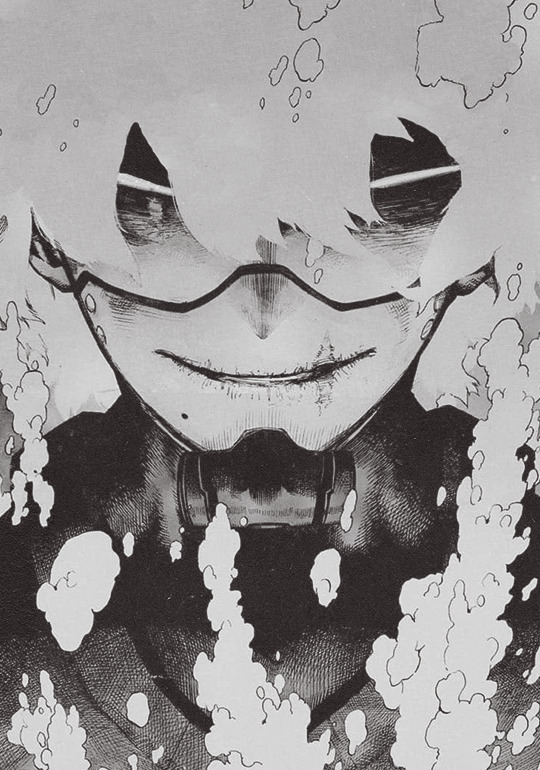
de·hu·man·i·za·tion
noun
the process of depriving a person or group of positive human qualities.
This thing A meta on the dehumanization of villains done by the heroes in the manga My Hero Academia, if you’re interested read more underneath the cut.
Before saying anything else, yes crimminals are a group of people who can be dehumanized. People who break the law are still in fact people, and while this is mainly talking about a fictional work it’s worth remembering that dehumanization is a tactic used to justify violence and the taking away of human rights from crimminals and incarcerated people.
People are still people. No matter what bad things they do they’re still people. And victims are victims even if they don’t present their victimhood in easy to digest ways. The conflict in My Hero Academia is one much more complicated than hero vs. villain because it exists within a society that generates its own villains through intentional neglect. I say neglect, because most heroes seem to be of the perspective that villains are either born evil, or choose to do evil entirely of their own free will and are never victims of circumstances or forced into the livelihood.
Villain isn’t just what costumed crimminals are called in MHA, it’s a literal legal definition that are given to certain crimminal offenders. We don’t know what exactly the legal ramifications are, but the fact that you can literally be called a villain just for being a repeat offender shows the way hero society views it’s crimminals.
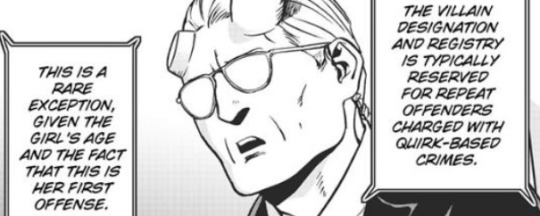
Villain has different connotations, it means an inhuman evil, not just a person who has done bad things. Police also have much more power in comparison to our society as well, in the manga vigilantes when his sister Makoto brings up the fact that technically her friend who has been accused of villainry is innocent until proven guilty and formally charged.
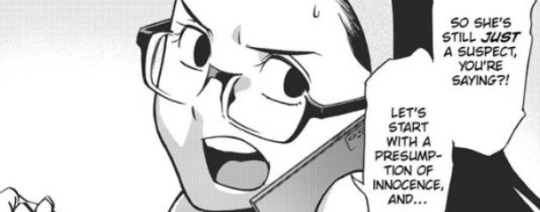
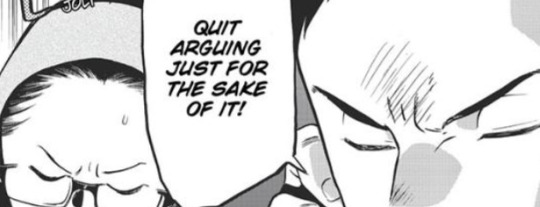
Tsukauchi gets physically angry with her.

What’s important in this situation is the girl they’re arguing about pop step is an innocent victim. She was kidnapped by a man, had a parasite inserted into her brain and is being physically controlled. What she needs to be is saved not put down, but the law is so inflexible it’s only capable of seeing her as a villain not as a person caught in a bad situation who needs to be saved from that situation.
And it’s much later revealed that there is technically a way to save her life, but because it requires breaking of the laws the police and heroes won’t ever do it. Beating her up won’t save her, it’ll just kill her as an innocent victim of circumstance, and stop her from doing any more damage to the people around her. Even if the police knew the way to save her life they won’t attempt it because it breaks the law.
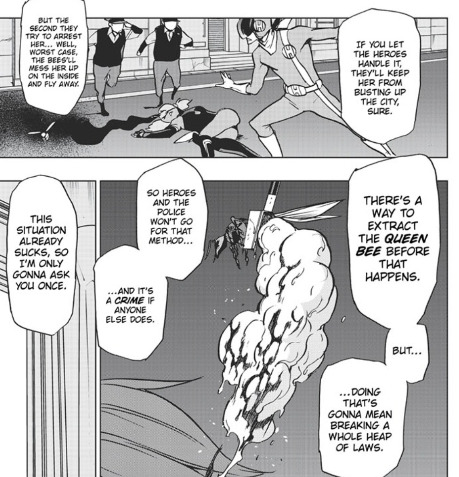
Being a by the book cop is all well and good, but when the law that exists doesn’t protect people there’s something wrong with the law. This isn’t an isolated incident either, we’re shown over and over again in the main manga as well this is always how villains are responded to, violent suppression.

At the start of the manga Shigaraki says this, that heroes and villains are both violent but because heroes are categorized as such their violence suddenly becomes heroic. All Might just dismisses what he says as him being a madman.
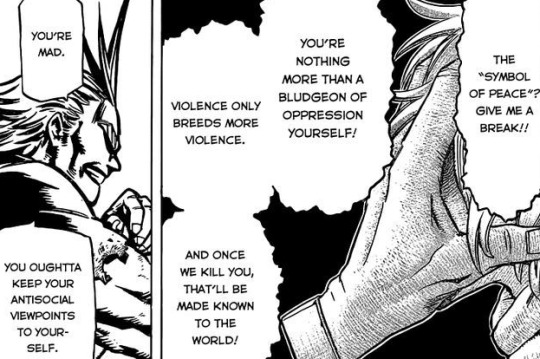
Not only that but in the aftermath of the break in the heroes all attempt to dissect Shigaraki’s character. They all make him out to be some kind of insane person that could have no possible rationale or reason behind his actions.
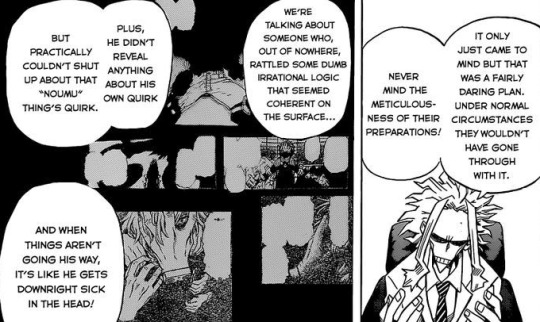

They dismiss Shigaraki’s attack as him simply being a man-child who thinks he can do whatever he wants. There’s no possible way that he could have any kind of sympathetic reason or human rationale, because he’s a villain, right? Except we learn later that’s not the case.
The words that Shigaraki is saying to All Might echo the words of his abuser. Shigaraki is like this not out of his own choice, but because he was deliberately shapped and moulded by someone. The reason why Shigaraki is impuslively violent is because as a literal five year old he was exposed to violence over and over again, and told this is who he was, this is what he was for.
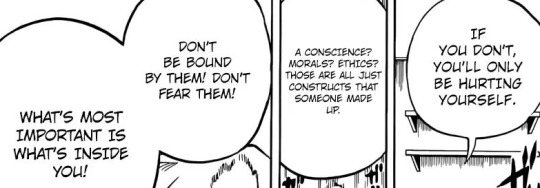
All Might later discovers that Shigaraki is not only the son of Nana Shimura’s son, a child he was personally responsible for when his mother died but decided to go along with his mother’s plan to abandon him (for his protection) and then also that All for One had specifically raised Shimura Tenko as a weapon against him. All Might knowing completely the manipulative kind of man that All for One is, and that Shimura must have been young when All for One took him in. Is still able only to see Shigaraki as a crimminal.

He is literally told that he can’t see him as anything other than a villain otherwise his judgement would be affected. At this point it’s not even ignorance, it’s intentional neglect. All Might SHOULD know that something is up with Shimura Tenko and that he didn’t choose to become a villain and was most likely influenced by All for One and yet the heroes all choose to ignore that fact and instead put him down like any other crimminal.
The problem with dehumanizing crimminals is that cops are not omniscient. Cops make mistakes. Cops are wrong, like... a lot. When you give people the power of law, there are people who are victims who were just trying to survive who are going to get caught up and treated exactly the same as people who are genuinely dangerous and out to hurt others like AFO. There are people who are perfectly innocent sometimes who will get caught up in it too.
People like Tsukauchi and Gran Torino may be good cops, they may be by the book cops, but that’s it. They’re the type that gets angry at the fact that due process exists because they believe that cops always suspect the right people, and that their hunches are never wrong or they could never possibly arrest someone who doesn’t deserve it. Neither of them acknowledge that the system is flawed and often makes mistakes, and because of that they end up believing that the police are always in the right, that the police could never prosecute someone wrongly, and those are dangerous beliefs to have for literally any law system, especially one with guys that shoot lasers out of their eyes.. The reason due process exists is not to slow the hand of justice, it’s because the legal system is really flawed.
The problem with giving too much power to police is that we don’t exist in a perfect world where the police will obey even their own laws. Why don’t we just put cameras in everybody’s houses? People who aren’t doing anything illegal won’t have anything to worry about. Unless suddenly things like speaking out against the government become illegal because the police now have the power to enforce it. What I’m saying is the rule of law does not necessarily = good or evil. Rules are not always good, and they’re also not absolutes they change all the time, and they also don’t always exist to protect people they need to protect. We see this literally happen in My Hero Acadmia, the government uses it’s power to kidnap a child and erase his name literally the exact same way All for One did so he could be raised as a child soldier.
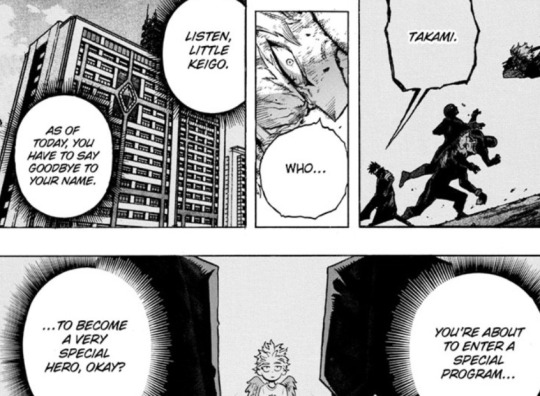
The conflict in My Hero Academia is not good guys vs bad guys, especially when the good guys don’t even act as good guys, and a step beyond that rigid laws and adherence to social order is not ever going to solve the problems associated with villains like Shigaraki because those laws are fundamentally unjust. They don’t exist to protect the people who most need protecting, they exist to oppress a minority in order to maintain social order.
Yes, violent crimminals are still a group of people. They are still human beings with rights. If they’re not guaranteed those rights they will be abused. We’ve literally seen this play out in action.

Hawks corners Twice, and then says he’ll go out of his way to Save Twice because he personally likes him. The only one of the villains Hawks treats as a human and not just an enemy to put down is Twice, and only because he personally likes him.

Twice brings up the fact that all of his friends deserve to be saved the same way he is. In fact, he even goes out of his way to say that he would die to save these people, and Hawks just ignores them because he sees no humanity in them only the one he personally likes.

Then Hawks goes out of his way to mention that if Twice doesn’t stop fighting back, it’s his fault if they die. Twice is trying to argue with Hawks that the people he sees as a danger to society, and that need to be taken down are humans capable of being kind just as much as they are a threat.


Twice murders him. He goes out of his way to murder him and stab him in the back. Hawks acting in a capacity as a hero, goes out of his way to dehumanize Twice again and again, completely ignore his own feelings and words, and then that conflict eventually escalates to murder. The point is not that Hawks had no choice but to kill him, but rather Hawks convinced himself he had no choice but to kill Twice.
The problem with applying this extremely harsh and punitive, even war-like view of law and order is that innocent people like Twice who literally only wanted to keep his friends happy will get caught up in it. Hawks literally thought that Twice had a chance for rehabilitation, that of the league he was the one most likely to rehabilitate and he still murdered him.
Heroes aren’t interested in rehabilitation. They are there to beat up villains. For several of them, it’s not even that far of a jump to get to the point where they start justifying killing villains. Miruko is almost excited to murder the Nomu who are, you know, innocent victims of mad science.

They want to take down Ujiko, but they don’t care at all about his creations which are all former people, and the heroes know this by this point. Finally, I want to discuss one of the most empathic characters in the manga.
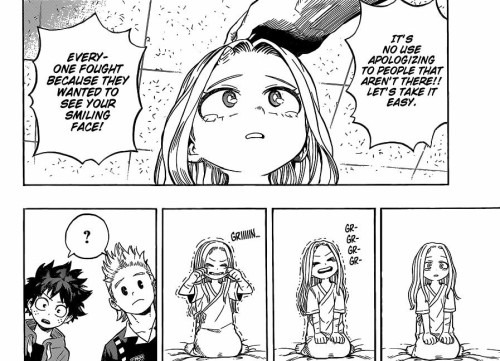
Aiawa is the current guardian of Eri. He participated in the mission to rescue her from Chisaki. He is someone who views Eri as a victim, and never gets upset with her or blames her for her out of control quirk the same way Chisaki once did.
Not only that but Aizawa himself has had a friend kidnapped and stolen away by All for One. He knows personally what All for One can do to a person, by changing Shirakumo to Kurogiri he completely warped his personality and controlled him to the point where the person he once was was almost gone.
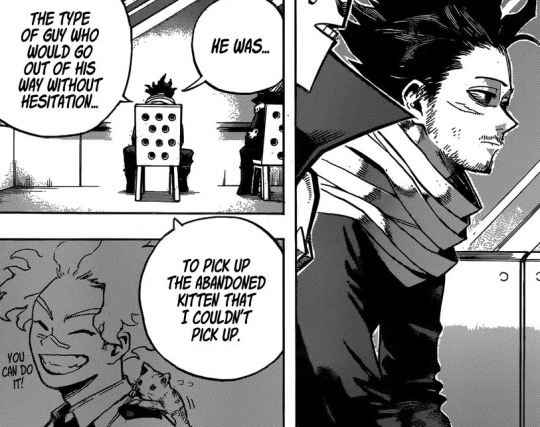
He knows All for One is capable of having that affect on people, not only that but Kurogiri himself says that Shigaraki is like a lost kitten that he can’t throw away because he feels responsible.


Aizawa has rescued a victim who is in similiar circumstances to Shigaraki. Aizawa has literally seen his best friend warped and changed by All for One’s hand. It should be obvious what Shigaraki has been through by now, and yet Aizawa doesn’t seem to care about Shigaraki’s circumstances at all.

Shirakumo has done bad things in AFO’s name as well. However, Aizawa decides to see Shirakumo as a victim. Even though Shirakumo is also complicit in the grooming and raising of Shigaraki for what he is, and almost certainly had a hand in manipulating him.
Aizawa empathizes with Kurogiri because he knows him personally, because he wants Shirakumo back. He doens’t bother to care about Shigaraki, because he doesn’t know Shigaraki personally. It’s not only hypocritical, it’s also just plain ignorance.
Aizawa is literally given every story reason to care. Shirakumo literally tells Aizawa that Shigaraki is a person he wants to protect and that he’s fond of. Aizawa believes that despite the terrible things he’s done, there’s still the boy who wanted to become a hero somewhere in Kurogiri, and he’s literally proven right.

Shirakumo still has a chance and is given a chance to become a hero, because Aizawa cares about him because they were friends but that’s about it. It’s not like Aizawa is driven by a very rigorous and strict sense of justice. He’s clearly willing to make exceptions, even for people who have put his students at risk, or even personally attacked him. He’s willing to reach out and understand Shirakumo’s circumstances, so clearly he doesn’t have a completely black and white view of good and evil. However, Aizawa’s reasons for sympathizing with Kurogiri and only Kurogiri are ultimately pretty selfish. It’s because he wants Shirakumo back. He doesn’t care about the circumstances, or even who Kurogiri cares about now he just wants his old friend back. Therefore he has no reason to care about Shigaraki who was victimized in a similiar way to Kurogiri, just because he doesn’t know him. I guess you’re not obligated to care about anybody, but it’s the exact opposite of empathy, especially in a character like Aizawa who has always shown to be especially protective of children. Nobody tries to understand Shigaraki, nobody tries to empathize with him, even though he also once had the exact same dream as both Shirakumo, and even Deku.

But Shigaraki’s just a monster that needs to be put down and stopped, there’s not a fragment of good in him like there was for Kurogiri, like there was for Twice.


Aizawa even gets angry at Ujiko for the callous way he treats human lives. For the way they were tossed aside. He’s righteously angry for Ujiko’s victims, especially Kurogiri. But he doesn’t stop to think for a second that Shigaraki is possibly another victim manipulated by the likes of Ujiko. Once again because Aizawa doesn’t personally know Shigaraki, or because Shigaraki is a bad person, who cares if he gets hurt and manipulated by Ujiko.


So we see by the heroes, Shigaraki referred to as a thing, Shigaraki referred to as an it. He’s just a monster to be stopped. It’s like he’s a boss in a video game the heroes need to kill.
Even though they literally see him being experimented on by Ujiko, an actual abuser who has used his money and connections to commit inhuman experiments his whole life that too must be Shigaraki’s fault somehow. The heroes are repeating the exact same lines that Shigaraki’s abuser All for One did on him.

By treating him as a monster. By treating him as a thing that needs to be killed, rather than a person who needs to be saved. They are doing All for One’s work for him by creating a symbol of fear and robbing a lifelong victim of abuse of his humanity. It’s like they want villains like Shigaraki to exist so they can remain heroes.
#mha meta#league of villains meta#lov meta#my hero academia meta#shigaraki tomura#aizawa shota#kurogiri#shirakumo oboro
504 notes
·
View notes
Text
Why did Dabi let Hawks into the League? (major manga spoilers ahead)
This is a question that’s been plaguing my head ever since Dabi proudly announced to Hawks that he’d known all along that he was lying.
If that was the case, what was the point of bringing him in? Surely Dabi must have seen this coming by enabling Hawks to continue his infiltration? What exactly was Dabi’s end-goal here???
It’s unclear whether or not if this will get explained eventually, but after giving it a lot of thought, I think I have a pretty good answer to the question regardless. Essay under the cut.
What is Dabi fighting for?
First, we have to address Dabi’s motivations. They run deeper than just making Stain’s will a reality - he’s taking steps that Stain never even considered to make, because even he was blinded by something that Dabi despises more than anything: hero idolization. Stain saw All Might as a true hero, someone worthy of the title, but in Dabi’s eyes, All Might is one of the biggest contributing factors to why there is such a huge problem with the hero system, and aside from All Might allowing other heroes to become complacent, it’s all because of Endeavour.
Hawks and Dabi are two sides of the same coin when it comes to the new no. 1; Hawks grew up seeing Endeavour’s ambition to surpass All Might as impressive and heroic, mostly due to the fact that Hawks himself lacks the drive to become so great, because all he wants is to live life comfortably. But for Dabi, Endeavour’s need to surpass All Might was nothing but a blinded greed for power, the need to be the best of the best for his own selfish desires rather than to actually save people. It was a path that led him to horrifically abuse his own family in order to achieve it, because he saw Quirk breeding as the only way to fix his own flaws. As such, Dabi, AKA Toya, suffered greatly at the hands of it. He knows firsthand just how much the hero system is unjust, allowing for people with unhealthy mindsets like Endeavour to gain positions of power. He knows that people admire Endeavour for his heroism, but are unaware of the monster that lurks behind closed doors, even when his temper comes out during public patrols. This is a man who is the very definition of a false hero, a man who let his eldest son die and traumatized his entire family.
Dabi goes on to claim in chapter 267 that there are no true heroes - this, however, does not mean that true heroes cannot exist. All he means is that there are simply no heroes currently present and he plans to change that, because in the system that society has right now, it’s near-impossible. Hero idolization forces heroes to become perfect images that people can admire, and it also enforces the mindset that only the greatest heroes can come from schools like UA and Shiketsu. This results in a flood of people longing to become heroes for reasons other than saving people. Uraraka, for example, while she is gentle and kind-hearted, is still only becoming a hero so she can support her family. It’s a well-paying job, and that kind of promise will most certainly lure anyone in who is desperate enough. Yes, she has good intentions in mind, and she does want to save people, but saving people is not her ultimate goal. So, by Dabi’s definition, she is not a true hero.
Becoming a hero should also not be as easy as it is, and becoming a hero certainly should not start at such a young age. UA and the other hero schools are putting teenagers between the ages of 15 - 19 at severe risk, and we’ve seen worst-case scenario results of this twice over the course of the series, and it’s terrifying to think that there are most likely more that we haven’t heard of.
First you have Shirakumo who died before he had even graduated, an incident that led him to becoming a nomu working for the League, who would then go on to cause the second result.
By placing children in such a dangerous training course, it automatically places targets on their backs for villains before they even get their licenses. The League proved just how incapable the staff are at protecting their students by not only successfully attacking a location within the school, but also kidnapping one of said students later on, even after UA’s attempt at keeping the location of the training camp hidden and Dabi himself had revealed their basic plan to Aizawa.
This is all fuel for Dabi’s fire in his journey to rip hero society apart at the seams, and while he is absolutely planning to kill every false hero he comes across, he also has a secondary plan in mind, and that is for the students.
In One’s Justice 2, Dabi has this particular voice line to Hawks: “We’re working for the glorious future where those UA kids are hollowed, and brought down to earth. We’ll have to see what you’re working for.”
Dabi knows that while they are all still young, there is still time to prevent them from falling into every hero’s brainwashed mindset: villains bad, heroes good, no matter what either of them do.
Something extremely important that the MVA and the current war arcs do is flip the black and white narratives on their heads, showing us just how human and empathetic the villains can be, while the heroes are doing nothing but making unheroic choices and opting for making the violent move first. We’ve seen all of the heroes do nothing but dehumanize Shigaraki, calling him “it” and “thing” like he’s just some monster that they have to kill. We’ve had to watch Hawks murder Twice in the name of “justice” simply because Twice refused to come quietly and be forced back into a life he felt miserable in. Even X-less chose to focus on the machinery next to him rather than getting a near-dead Shigaraki medical attention, and we all know how karma decided to treat that.
And this is where I would like to bring your attention to Tokoyami.
We’ve seen multiple times before how Dabi seems to have no interest in actually harming the students - initially, anyway. He leaves Aoyama alone even though he saw him; he taunts Shoto but doesn’t attack him to get him away; and lastly, Tokoyami first showing up to rescue Hawks actually calms Dabi down. Dabi shows no intent of hurting them because they’re still just kids, not heroes.
Calling back to how the heroes are currently being depicted as the ones making all the disturbing decisions, Dabi doesn’t hesitate to be the first to call out their decision to bring the students into what is essentially a covert-ops assassination mission that has turned into an all-out war. He first recognises that the boy in front of him is just that: a boy, and instead of attacking, Dabi gives Tokoyami a chance.
But what chance, exactly? To escape? Absolutely not.
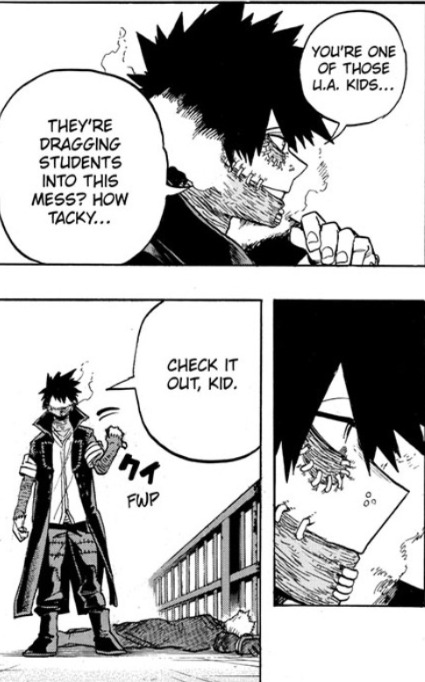
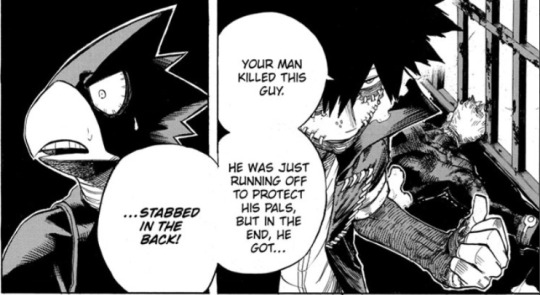
The first thing Dabi does is make Tokoyami aware of the crime his so-called mentor just committed, and carefully wording it so that the stakes were made clear.
Twice was trying to run away to protect his friends.
But Hawks still killed him.
Dabi is giving Tokoyami a chance to recognise that the hero system he admires hides many skeletons in its closet, and is something that is severely corrupt. He’s giving Tokoyami a chance to rethink his working relationship with Hawks and everything Hawks has taught him.
But Tokoyami doesn’t take it.

As soon as Hawks speaks up again, Tokoyami returns to being obedient, ignoring everything Dabi just said and focusing only on the task at hand regardless of the moral dilemma presented before him, and that’s when Dabi’s intention for Tokoyami changes, because as Dabi put it, “You’ve stopped thinking for yourself.”
And indeed, Tokoyami has. Tokoyami is now cemented in the brainwashed mindset, blindly putting his faith in that Hawks’s decision to kill Twice was right, simply because Twice is the villain and Hawks is the hero, and Dabi realises this.
Tokoyami is now a false hero, and thus on Dabi’s kill list.
So, we have established that Dabi fully intends to wipe-out existing false heroes, while simultaneously trying to save those who have the chance to recover/escape from the brainwashing before it’s too late.
“Keigo Takami!!”
It’s no secret that Dabi clearly knows exactly what kind of situation Hawks is in. The fact that he knows Hawks’s real name alone tells Hawks that Dabi knows far more than he is comfortable with. So, seeing as Dabi was able to see through Hawks’s lies so easily, let’s assume that Dabi knows most, if not all, of what we the readers know about Hawks and how the HPSC groomed him.
Considering that Dabi came from the no. 1 hero’s household, there’s a high chance that he knows quite a bit about the HPSC and just how shady they actually are, especially if the theories are true that they had a hand in covering up his own death. Dabi is well-aware then that the HPSC is responsible for the hero system being so broken, and the reason they do nothing to fix it is so they can stay in power. They are not afraid to make questionable decisions which they know is only making the villain situation worse, because villains are what’s keeping them in business. And what’s sad about this is that even when the decisions they present are clearly morally wrong, the heroes are in no position to argue, because the HPSC is in complete control of their jobs. The HPSC governs the hero system, so whatever they do must be just, right?
Well, Dabi definitely knows the answer to that.
The HPSC deliberately manipulated the heroes to believe that the UA students were needed on the front lines for this mission, and so far, we’ve seen that they really weren’t, actually. The evac team remains the best place for the students to be, because while the pros with all the combat experience can focus on the villains, the heroes-in-training can focus on the smaller task of getting people to safety. Sure, Kaminari, Tokoyami, and the other front-liners helped, but the pros absolutely overwhelmed the PLF on their own. All the front-liners did was just kind of...pave the way, make things easier, and then they were sent back to rejoin their classmates. And the heroes didn’t question the decision at all.
What’s even more disturbing is that the students weren’t even aware of what they were getting into, and most of the pros weren’t aware that the students weren’t aware.


But, as mentioned before, Dabi doesn’t hesitate to call this out.
It’s highly likely that he’s able to connect that the HPSC were the ones who organised this attack and sent the kids out onto the battlefield, which also means that he’s unfortunately no stranger to the HPSC reducing talented children to nothing but weapons, a concept he is also personally familiar with.
Toya was bred with the intent of creating a Quirk superior to Endeavour’s, and then put under extremely harmful training that abused both his mind and his body. We already know that Dabi is heavily against valuing a person’s Quirk over their individual worth, thanks to his fight with Geten.

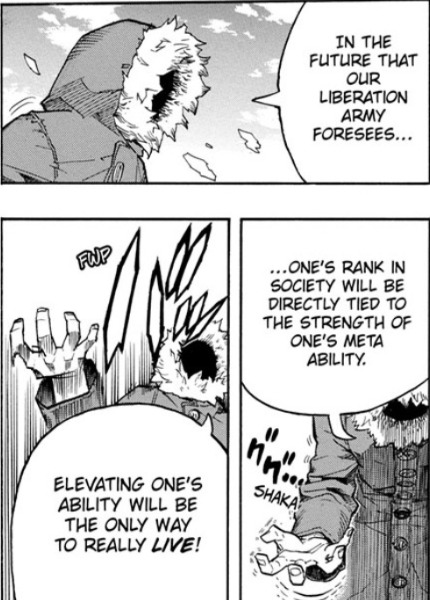


And in the world of heroics, this unhealthy mindset is unfortunately in abundance, especially in Hawks’s case.
What makes Hawks an especially tragic character is that he started out with the same longing to be a great hero that every child has. He wanted to be a comforting sight to those in need, and his innocent mind thought that the HPSC would help him make that reality.
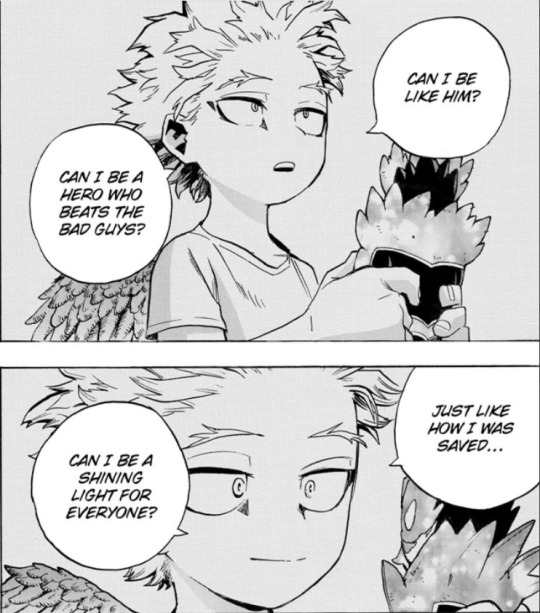
Instead, the HPSC presented him with a life-changing decision that a child his age has absolutely zero mental capacity to consent to, and it’s heartbreaking that Hawks’s grooming began right from the second they met. The HPSC forced a child into intensive training at an age even younger than students training at proper hero schools, and they ever-so-gradually began chipping away at Keigo’s hopeful dream, starting with the erasure of his own name, the first step in disconnecting him from who he once was.
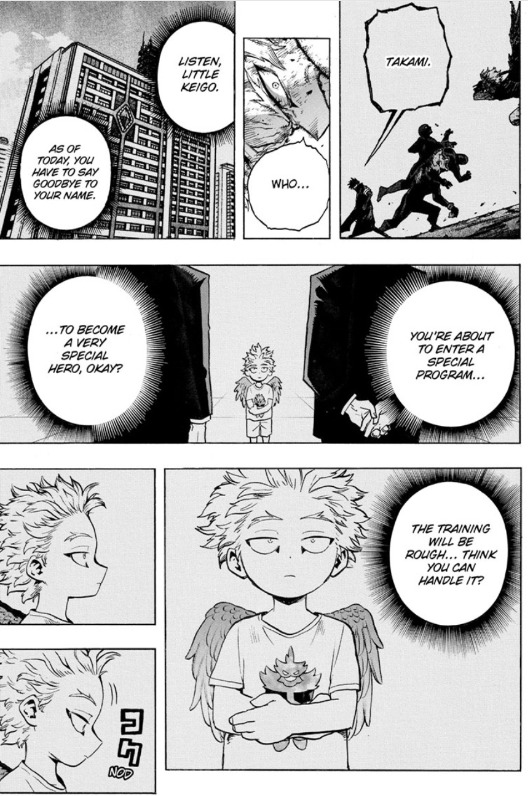
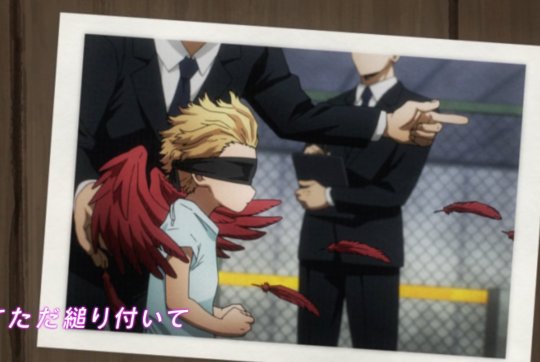
Over the years of the hero Hawks growing up under the HPSC’s wing, he had been stripped of his childhood and moulded into the perfect image of a hero, one that is loveable to the public, obedient to his handlers, talented in his work, and completely self-sacrificing to his missions.
The HPSC has successfully groomed Hawks so that his selflessness is now their trump card that they hold over him - instead of using his selflessness to save others no matter who they are, he’s been manipulated to believe that he has to give up everything in his life to be a great hero, that he’s not suited for being a “shining light”, thus bringing about his new goal of creating a world where heroes have free time, a goal that he is unfortunately pursuing in the wrong way. He’s been brainwashed to not think about villains too much, to not sympathize with them and dig into where they came from and why they became villains, which is why he’s targeting the wrong problem when it comes to making his dream a reality. He believes that he has to solve every case as fast as possible, and eventually there will be virtually no more villains left to hunt down, but the League has already shown us that the roots of villainy stretch much further down than that.
We catch a glimpse of how Hawks even acknowledges that he’s being held down by hero society, caged, and yet he does nothing to change it.
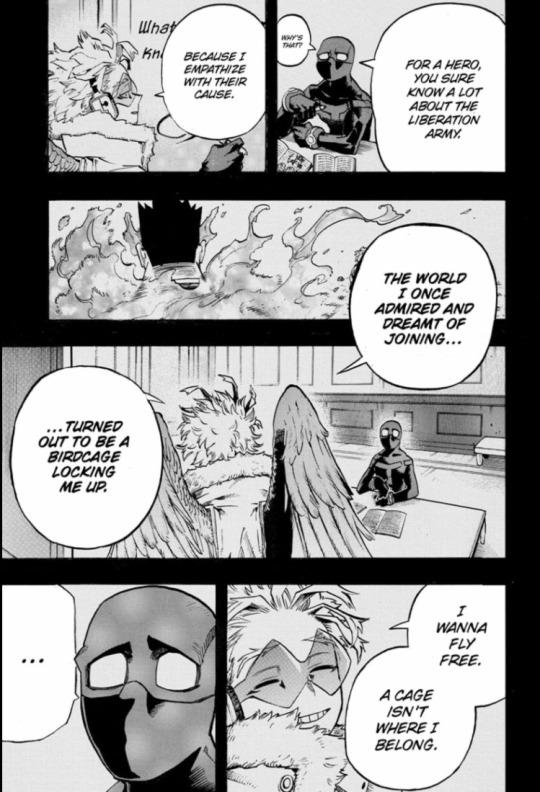
The result of his grooming has left him stuck in a thoughtless state, where it’s easier to believe that everything he is doing is right, and the villains are wrong.
And this is unfortunately something that he has spread to Tokoyami, as evidenced earlier.
Hawks is a hero who was groomed and manipulated from a young age, being thrown into training just so he could become a tool for those in power to use.
Sounds awfully familiar, doesn’t it?
Dabi can read Hawks like a book
It’s wonderfully ironic how Hawks prides himself in being capable of fooling anyone and everyone, making himself the hardest person in the room to read while simultaneously being able to read everyone else, and yet the one person that he couldn’t predict ends up being the only one who knows him better than anyone else.
Throughout all of their interactions, Dabi has always been two steps ahead of Hawks, able to catch him off-guard and ruffle his feathers. Keeping in mind that Dabi had known all along that Hawks was faking his desire to join the League, it’s interesting just how long Dabi kept stringing him along. Was he simply doing it for his own enjoyment?
Maybe a small part of him was, but in the long run, Dabi was absolutely still testing Hawks’s worthiness. What makes this great, however, is that Hawks was unaware that Dabi wasn’t testing him for what he originally thought.
Loyalty was absolutely out of the question for Dabi, since he knew from the start Hawks wasn’t planning on being as such. So, what exactly was Dabi looking for?
Looking through the tests that we know Dabi put Hawks through (the battle with Hood, and taking out a hero of Hawks’s choice), we can analyse what Dabi was impressed with, and what he wasn’t.
First off, there’s not a lot that Dabi didn’t like about what Hawks did. The most he complained about was Hawks simply bringing along Endeavour to the Hood fight instead of someone else.
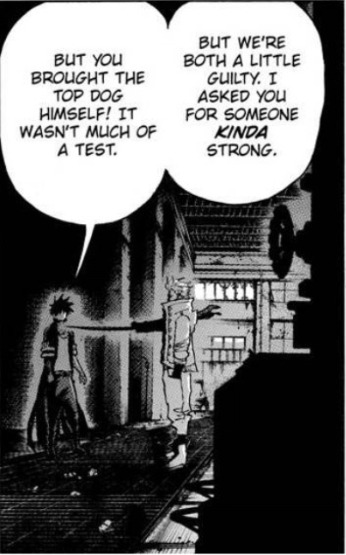
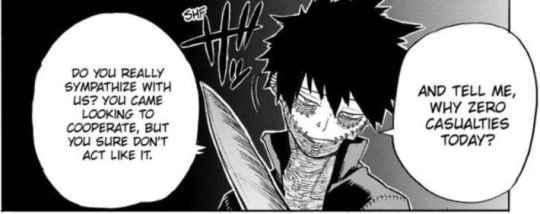
It appears that he also complains about Hawks not letting anyone die, but Dabi is always quick to point out when heroes are prioritising lives, and this will become important later.
Then, we have Dabi asking Hawks to take someone out who isn’t the no. 1. When Hawks brought him Jeanist’s body, Dabi was genuinely surprised, but pleasantly-so.



Now, Jeanist’s death here serves multiple narrative purposes:
It shows us that Hawks won’t hesitate to kill for a mission (RIP Twice),
It shows Dabi that Hawks is capable of killing anyone, not just villains,
And lastly, it serves as blackmail for Dabi in his pursuit of bringing down false heroes.
(There’s also Bakugo’s whole thing with his hero name, but this isn’t about him.)
That last point is what granted Hawks access into the League, contrary to Hawks believing that the only reason he got in is because the merging of the League and the MLA suddenly made it easy to do so.

Dabi wasn’t going to let Hawks in without making sure he had a backup in mind in case Hawks tripped up.
But, blackmail wasn’t the only thing that Dabi was looking for. If anything, it was just a bonus.
What the Hood battle and Jeanist’s death showed to Dabi were the two sides that Hawks possessed: a bird of prey that isn’t afraid to kill for a cause, and the innocent child who just wanted to help people. Dabi was searching for both of those qualities within Hawks, because they’re both qualities that Dabi himself has.
Dabi relates to Hawks
As previously mentioned, there’s no doubt that Dabi is aware of how Hawks was trained and forced into a life he didn’t want. He’s very aware of how much Hawks longs for freedom but still wants to help those in need, but what separates them from each other is that Dabi has achieved the freedom that Hawks wants and is pursuing his dream in a way that works.
Dabi kills for his cause, but that cause is ultimately to prevent the future suffering of innocent lives at the hands of false heroes. In his own twisted way, he too wants to save lives. He wants to stop the possibility of another him from being created. He is choosing to be the unfriendly reminder that something is very wrong with the current system, and it needs fixing ASAP.
And that is exactly why Dabi can see through Hawks’s lies, because he recognises that Hawks too is a victim of the same system.
Dabi’s plan for Hawks
With Hawks presenting himself in front of Dabi, it offered up a multitude of opportunities for him. Dabi not only had a new connection to Endeavour through Hawks, but here was a hero who was prepared to get his hands extremely dirty just for a way to bring down the League.
Dabi’s prior knowledge of Hawks and his past allowed him to constantly have the upper hand, but not in case Hawks attacked.
Through testing Hawks to see what qualities he possessed, Dabi was able to see if Hawks was worthy not for joining the League, but for undoing the brainwashing he’d been subjected to.
Dabi let Hawks into the League because he was giving him a chance, the same chance he gave to Tokoyami, to see hero society for what it really was and decide to do something about it. Dabi saw the potential in Hawks to be a true hero, to return to the boy he once was and save people for the sake of saving them. He saw Hawks’s potential to kill false heroes and that he wasn’t afraid to do it, and the idea of someone thinking the same way as Dabi, of understanding him and his goals wholly, would have absolutely been enticing to him.
Dabi claims to not care about the League, but even if that were true, Dabi recognises that the other League members are important to each other, especially when it comes to Twice and how eager he is to make friends. Dabi introducing Hawks to the League was his chance to show Hawks that they’re all human, and gain sympathy for them and what they stand for. It would have been the ultimate power move on Dabi’s part for Hawks to turn on the heroes and go villain, undoing what hero society did to him, providing him the freedom he always wanted and ultimately proving Dabi and his ideals right.
But, unfortunately, that wasn’t how things went.
How Dabi’s plan backfired
When Hawks first joined the PLF, it was obvious that Dabi was sticking close to him, both to keep an eye on him and to be genuinely friendly and accepting.

It’s rare to see a smile like this on Dabi when he’s around heroes, and he never smiles around the League, but for Hawks specifically, Dabi is always smiling. I think it’s safe to say that Dabi did genuinely enjoy Hawks’s company and that he was the only one Dabi actually liked, which is probably what led to him being comfortable with leaving Hawks to his own devices for the next few months, especially when he started a budding friendship with Twice.
Dabi must have been confident that Twice would be the one to break through the last of Hawks’s walls, because if we were seeing genuine smiles from Hawks, then Dabi must have seen them too.
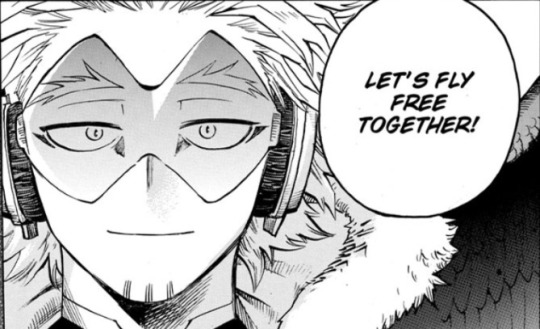
However, it’s clear that Dabi severely underestimated Hawks’s capability to kill anyone.
Hawks leaked the information to the heroes, an attack was launched, and Dabi immediately knew why.
And he was, understandably, incredibly pissed.
Upon confronting Hawks and hearing how he was about to kill Twice, Dabi used what he’d learned about Hawks during the Hood fight to his advantage and triggered Hawks’s rescue response, prompting him to subconsciously save Twice from Dabi’s flames, because Dabi knows deep down that a hero is who Hawks really is. What he was most likely hoping was for Hawks to maintain that response, but he instead made a mistake and directly caused Hawks to go back into mission-mode.
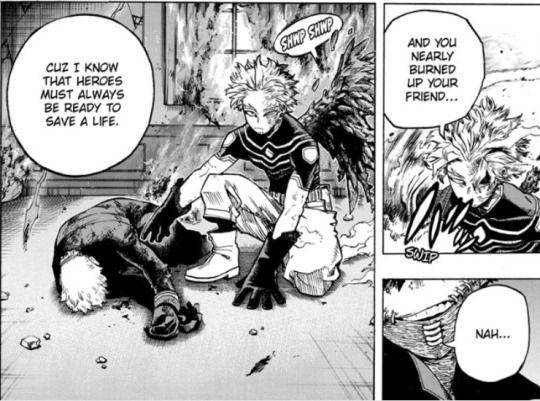


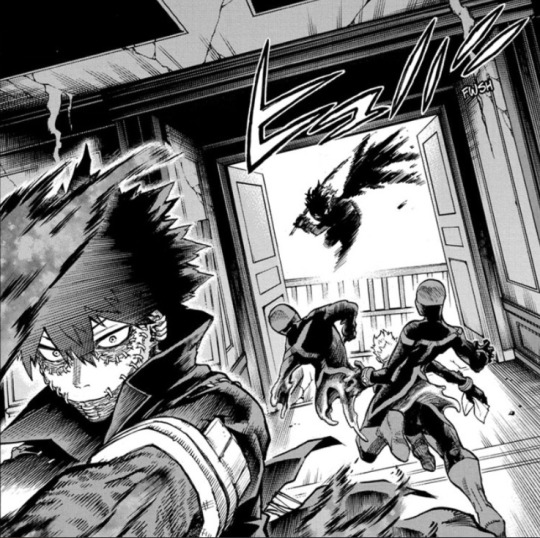
And it’s just a downward spiral from there, with all of Dabi’s last-ditch efforts falling flat. In one last desperate attempt to reach through to Hawks, he called out his name. His real name.

Dabi’s final chance to bring Hawks to his senses was to try and reconnect him with his past self of whom the HPSC had carefully erased, and it almost worked. Dabi let Hawks know that he knew everything about him, everything that he once was, but just like with Tokoyami, Dabi learnt the hard way that Hawks was beyond saving.
With Twice’s death, Dabi completely lost it, scolded Hawks for not focusing on him, and dropped one last bomb on Hawks before ending yet another false hero.
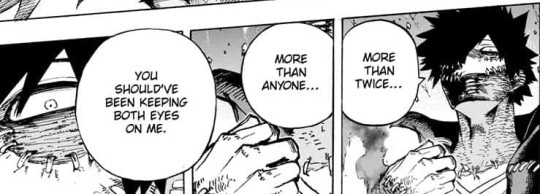

Until, yet again, that too backfired due to Dabi’s hope that he could save an innocent mind from the hero system’s brainwashing, and Hawks escaped with his life.
We get a glimpse of Dabi’s defeated expression, the knowledge that he can’t cry, and that he just lost two friends within the span of just a few minutes.


What next?
Honestly, if there’s one thing that is going to break Hawks, it’s knowing the truth about Endeavour. My hope is that Dabi is going to have a chance to make his reveal public to the entire nation, and exposing Enji Todoroki for the abuser he is will really shake things up.
At the moment, it’s still not clear exactly what Dabi told Hawks in his redacted bubble, but it was obviously something relating to his identity. Only time will tell what Hawks knows once he regains consciousness.
#dabihawks#dabi#mha hawks#bnha hawks#boku no hero academia#my hero academia#mha#bnha#theory#dabi is a todoroki#mha manga spoilers#bnha manga spoilers
293 notes
·
View notes